9 The Earthly And Temporary Covenants: The Error Of A Conditional Covenant Of Grace With Its Duty-Faith And Free-Offer Perversions
A Summary Of The Teaching Video
Some of the points I cover in this teaching video:
I return to the subject of a conditional covenant of grace, explaining why I believe the scriptures do not identify any such agreement. I show what the Presbyterians and the Reformed Baptists believe on the matter, and how their misunderstanding of the covenants has resulted in the teachings of duty faith and the free offer. I provide a response to these pernicious teachings, illustrating where the Presbyterians and the Reformed Baptists go wrong in their covenantal framework. I draw the study to a close by affirming the views I set forth to be aligned with the historic development of covenant theology according to the teachings of Benjamin Keach and John Gill.
Jared Smith, Muntinlupa, PH (6/01/2023)
An Outline Of The Teaching Video
The Arrangement Of The Biblical Covenants
A Summary Statement On What I Believe With Reference To The Earthly And Temporary Covenants
The Covenant Theology Of The Presbyterians And The Reformed Baptists Collapses If There Be No Conditional Covenant Of Grace
An Affirmation Of The Two Spiritual And Perpetual Covenants According To The Timeline Of Sovereign Grace
An Affirmation Of The Two Spiritual And Perpetual Covenants According To The Framework Of Sovereign Grace
The Eternal Decree Of The TriUne Jehovah—A Blueprint For All That He Will Bring To Pass In Time
The Electing Love Of God The Father
The Covenant Of Works
The Reprobation Of The Non-Elect
The Salvation Of The Elect
The Redeeming Grace Of God The Son
The Sanctifying Power Of God The Spirit
The Covenant Of Redemption, Or, The Covenant Of Grace
An Explanation Of A Conditional Covenant Of Grace Espoused By The Presbyterians And The Reformed Baptists
They Believe There Are Three Main Covenants
The Covenant Of Redemption, Relegated To The Backdrop Of History
The Covenant Of Works Made With Adam Prior To The Fall, Requiring Of Him Perfect Obedience To The Heart Law
The Covenant Of Grace Made With (Or Promised To) Adam After The Fall, Requiring Of Him Saving Faith In The Redemptive Work Of Christ
Their Distinction Between Law And Gospel Is Based On This Dichotomy Of Obedience To The Law On The One Hand And Saving Faith In Christ On The Other
Although They Distinguished Between Law And Gospel, Yet They Impose Upon The Unregenerate Privileges Belonging Only To The Regenerate, And Impose Upon The Regenerate Duties Belonging Only To The Unregenerate
While The Traditional Reformed Baptists And The 1689 Federalists Subscribe To A Conditional Covenant Of Grace, Yet They Nurture Different Views On Its Relationship To The Earthly Covenants
The Pernicious Doctrines Of Duty Faith And The Free Offer Springing Out Of A Conditional Covenant Of Grace
The Free Offer Of The Gospel
The 1646 Westminster Confession Of Faith
An Explanation On What The Free Offer Of The Gospel Means
Two Reasons Why I Reject The Free Offer Of The Gospel
It Puts The Unregenerate Sinner Into A Neutral Position, Assuming He/She Is Capable Of Receiving This Free Gift Of God Through The Offer Of The Gospel
It Presupposes The Unregenerate Sinner Is Under The Authority Of Two Covenants At The Same Time, And Therefore Has The Warrant To Savingly Believe On Christ
The Doctrine Of Duty Faith
Two Reasons Why I Reject The Doctrine Of Duty Faith
So Long As The Unregenerate Sinner Remains In That Condition, He/She Is Bound To The Authority And Responsibility Of The Covenant Of Works
The New Birth Gives To The Sinner The Ability (Spiritual Capacity) And Authority (Covenantal Warrant) To Savingly Believe On Christ
The 1689 Baptist Confession Of Faith Is Not The Benchmark For The English Particular Baptists
The 1689 Baptist Confession Of Faith
Benjamin Keach Rejected A Conditional Covenant Of Grace, Dismantling The Covenantal Framework Of The Confession
John Gill Agreed With Keach’s Position, Developing The Teachings In His Doctrinal Body Of Divinity
The TriUne Jehovah Brings To Pass In Time The Covenant Of Redemption (Grace) From Eternity
The Four Earthly And Temporary Covenants, Together With The Covenant Of Works And The Covenant Of Redemption, Along With The New Covenant, Have Absolutely Nothing To Do With A Conditional Covenant Of Grace
A Final Word
An Automated Transcript Of The Teaching Video
The Arrangement Of The Biblical Covenants
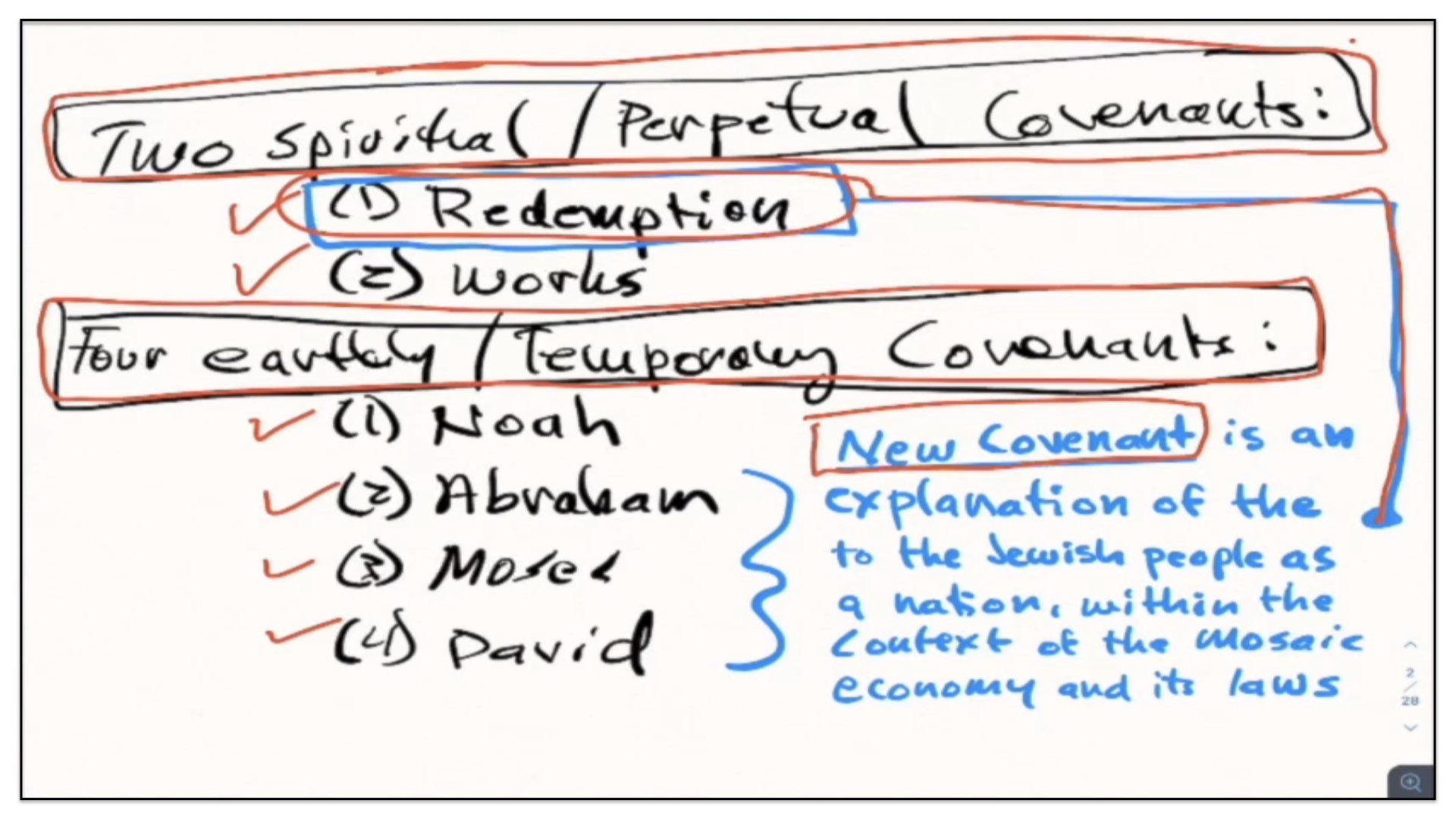
I’d like to welcome you back for another study in the Word of God. We come again to the subject of the earthly and temporary covenants. And if you remember, I believe these covenants can be arranged under one of two categories. First, there are two spiritual and perpetual covenants—this would be that of Redemption and that of Works. And then secondly, there are four earthly and temporary covenants—that which God made with Noah, with Abraham, with Moses and with David. As for the New Covenant, I don’t believe this is an actual covenant, but rather, it’s an explanation for the Covenant of Redemption to the Jewish people as a nation as they were then under the Mosaic economy and subject to its laws.
A Summary Statement On What I Believe With Reference To The Earthly And Temporary Covenants
Now, for the past several weeks we have been concentrating our attention on these four earthly covenants and in order to simplify my understanding of these covenants, I prepared a written statement and I’ve methodically been working through that statement with you. And I’d like to continue that in this study. To place you in remembrance of what we have looked at in the previous weeks:
“I believe the thread which ties together the earthly covenants is the promise of the coming Messiah. First, each covenant was made by God with individuals belonging to the bloodline through which the Messiah would be born; and second, the purpose for each covenant is directly linked to the coming of the Messiah. It’s from this bloodline that God the Father would prepare a body for His Son. And it’s for this reason God set this bloodline apart with special honor (making with them earthly covenants, giving to them special laws and bestowing upon them earthly blessings) during the first 4,000 years of history. However, with the birth of the Messiah came the end of His bloodline, resulting in the cancellation of these covenants and the termination of the special honor God placed upon the Jewish people as a race.”
Now we continue in the study with the following statement:
“In no sense should these earthly covenants be identified with a conditional covenant of grace.”
The Covenant Theology Of The Presbyterians And The Reformed Baptists Collapses If There Be No Conditional Covenant Of Grace
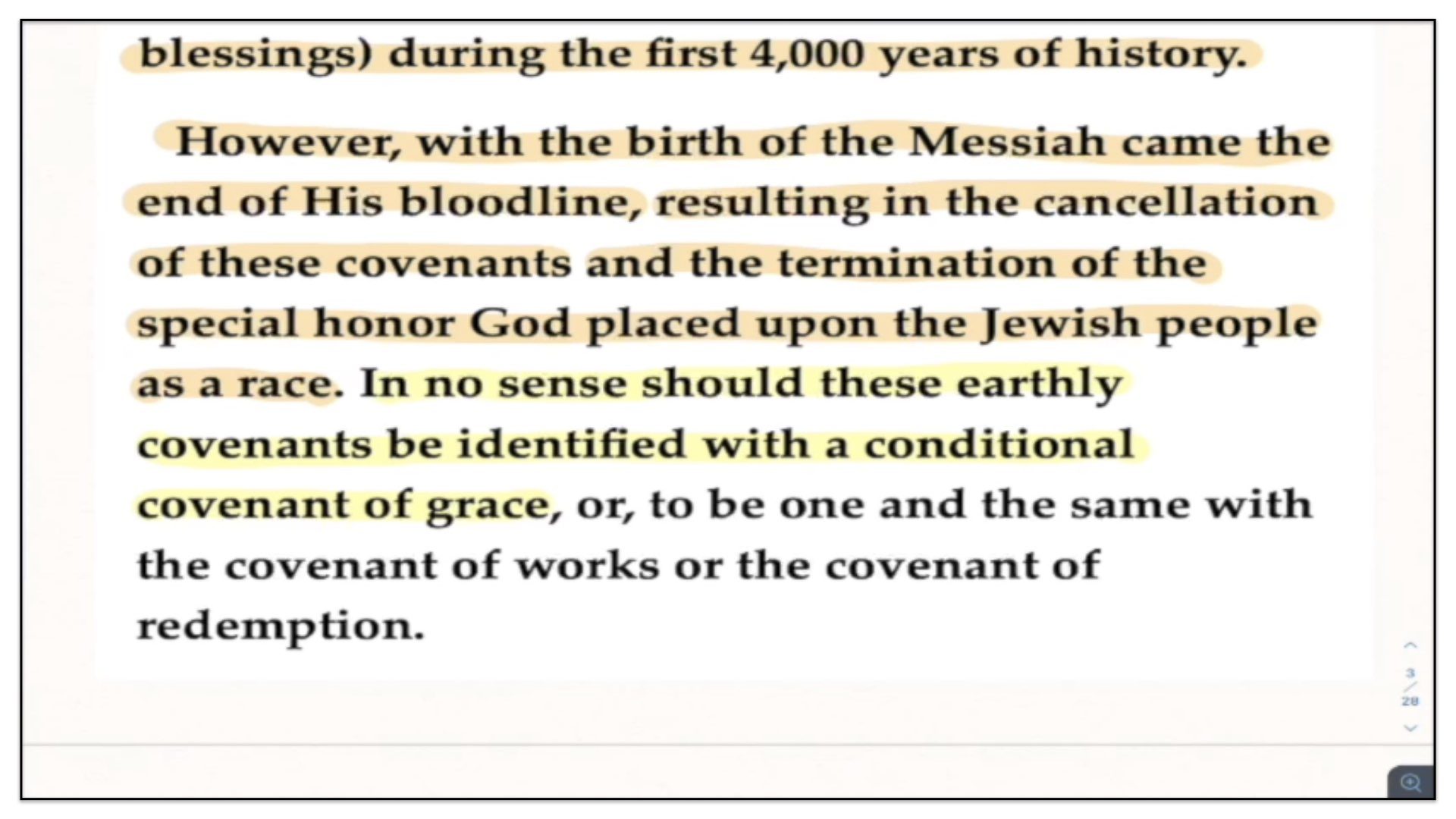
And I pause there, because this is the statement I would like to focus on for this study. I’d like to underscore once again some important points related to this conditional covenant of grace. My dear friends, this is perhaps the most important topic when it comes to examining the biblical covenants. You see, the Presbyterians and the Reformed Baptists, both groups, believe that there is such a thing as a conditional covenant of grace and it’s based on that idea that the entire framework of their covenant theology is built. But what if there is no such thing as a conditional covenant of grace? If there’s no such thing as a conditional covenant of grace, then the entire framework of the Presbyterian and Reformed Baptists’ covenant theology collapses. And that is my view. I do not believe there’s a conditional covenant of grace and therefore the covenantal framework of the Presbyterians and the Reformed Baptists is wrong.
An Affirmation Of The Two Spiritual And Perpetual Covenants According To The Timeline Of Sovereign Grace
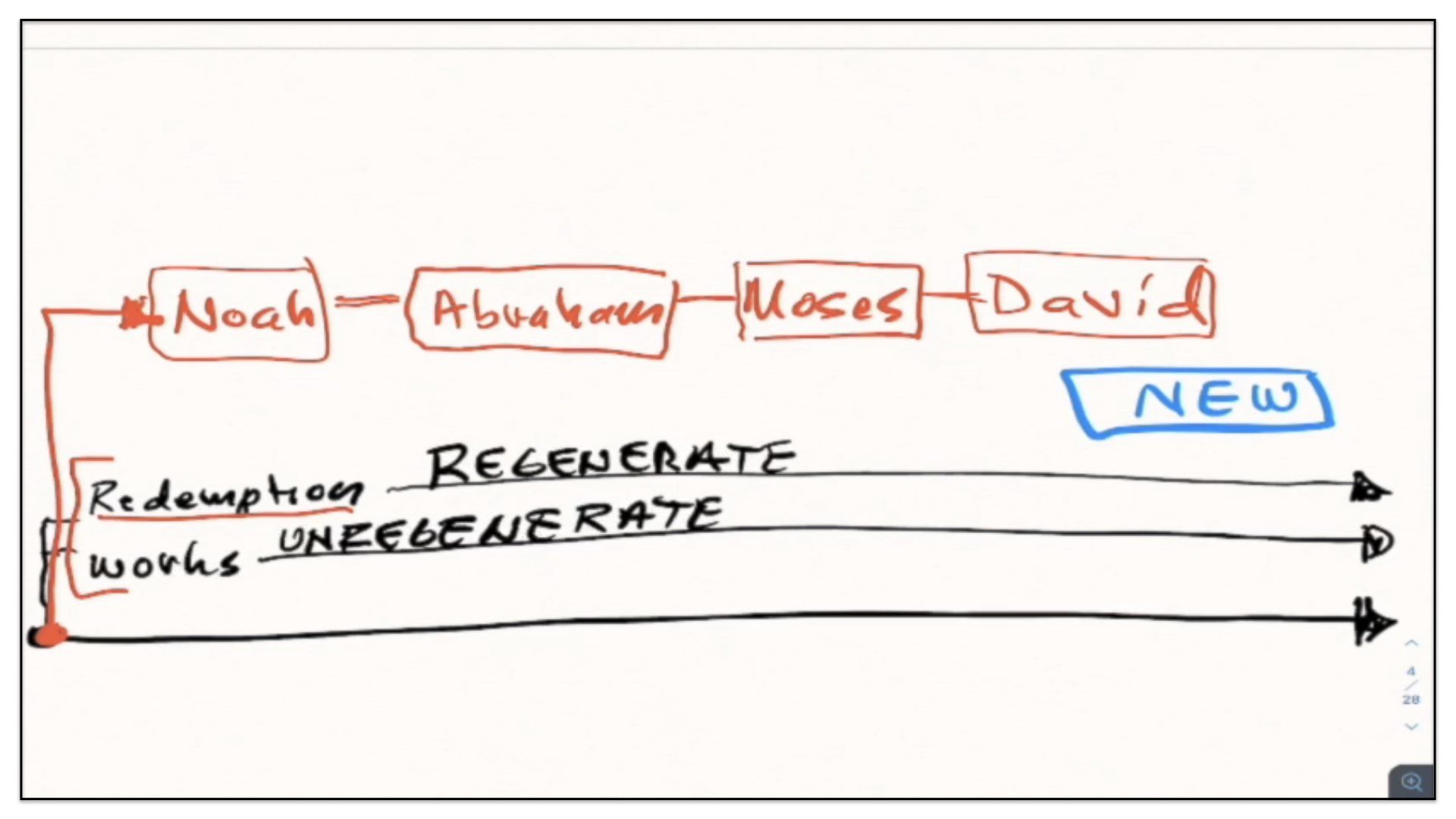
Now, allow me to take this issue and refer you to the diagram and the timeline that I have built for you in the previous weeks. Remember, I have presented to you this basic timeline of history where there are two permanent and spiritual covenants that run through the course of history—that of Redemption and that of Works. Under the Covenant of Works all unregenerate sinners are accountable unto God. And under the Covenant of Redemption all regenerate sinners are accountable to God. And this has been true for Adam and Eve in the garden of Eden, throughout the course of history, to the end of the world. Now apart from these spiritual and perpetual covenants are four earthly and temporary covenants—a covenant God made with Noah, with Abraham, with Moses and with David. And then of course, there’s the New Covenant—the New Covenant which is not an actual covenant, but rather, an explanation of the Covenant of Redemption to the Jewish people as a nation as they were then under the Mosaic economy and subject to its laws.
An Affirmation Of The Two Spiritual And Perpetual Covenants According To The Framework Of Sovereign Grace
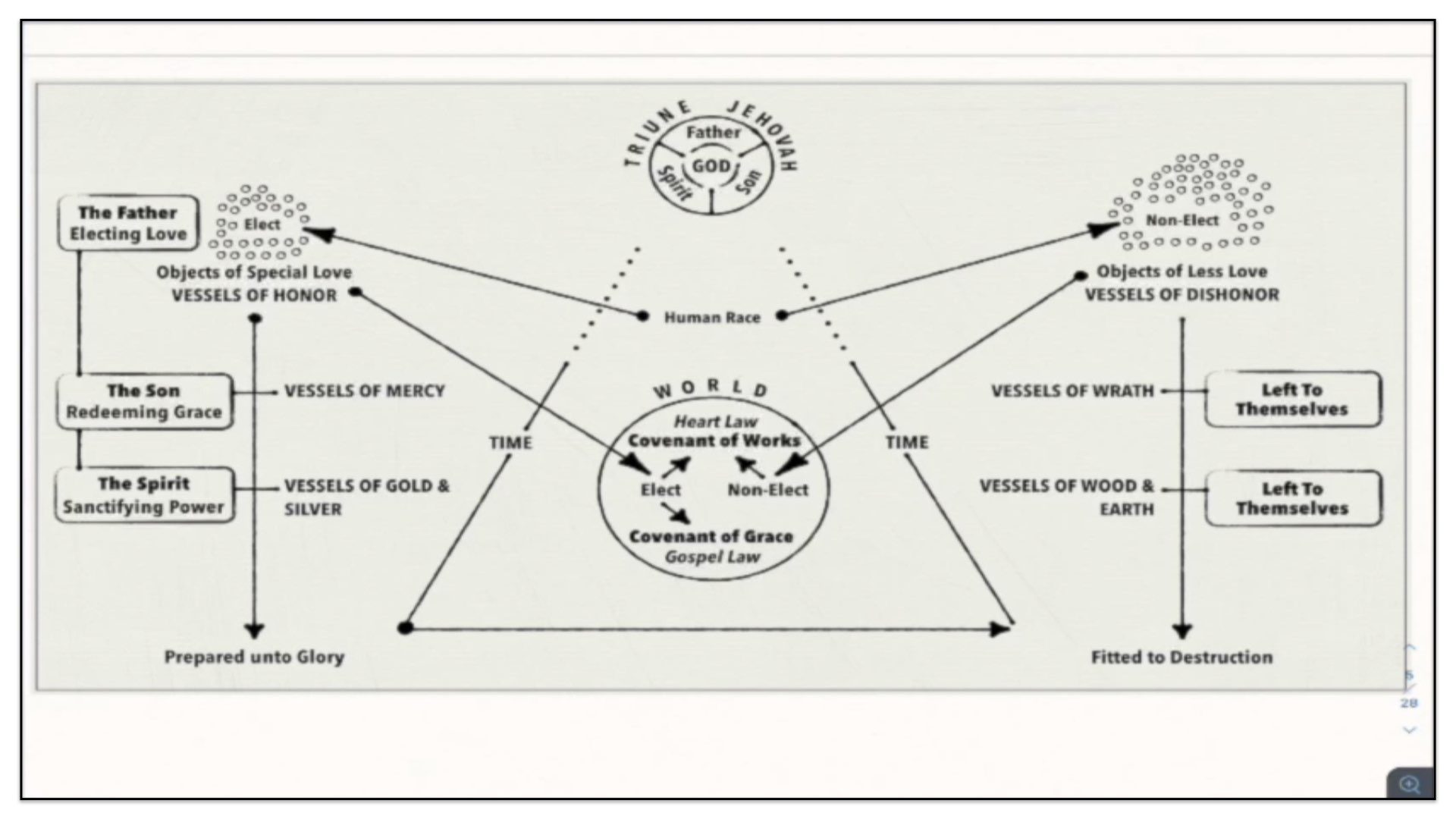
Now, that’s my view of the covenants. Let me just for a moment take these two spiritual and permanent covenants, and now refer you to the Framework of Sovereign Grace, just to show you how those two covenants work themselves out within the framework or overview of history.
The Eternal Decree Of The TriUne Jehovah—A Blueprint For All That He Will Bring To Pass In Time
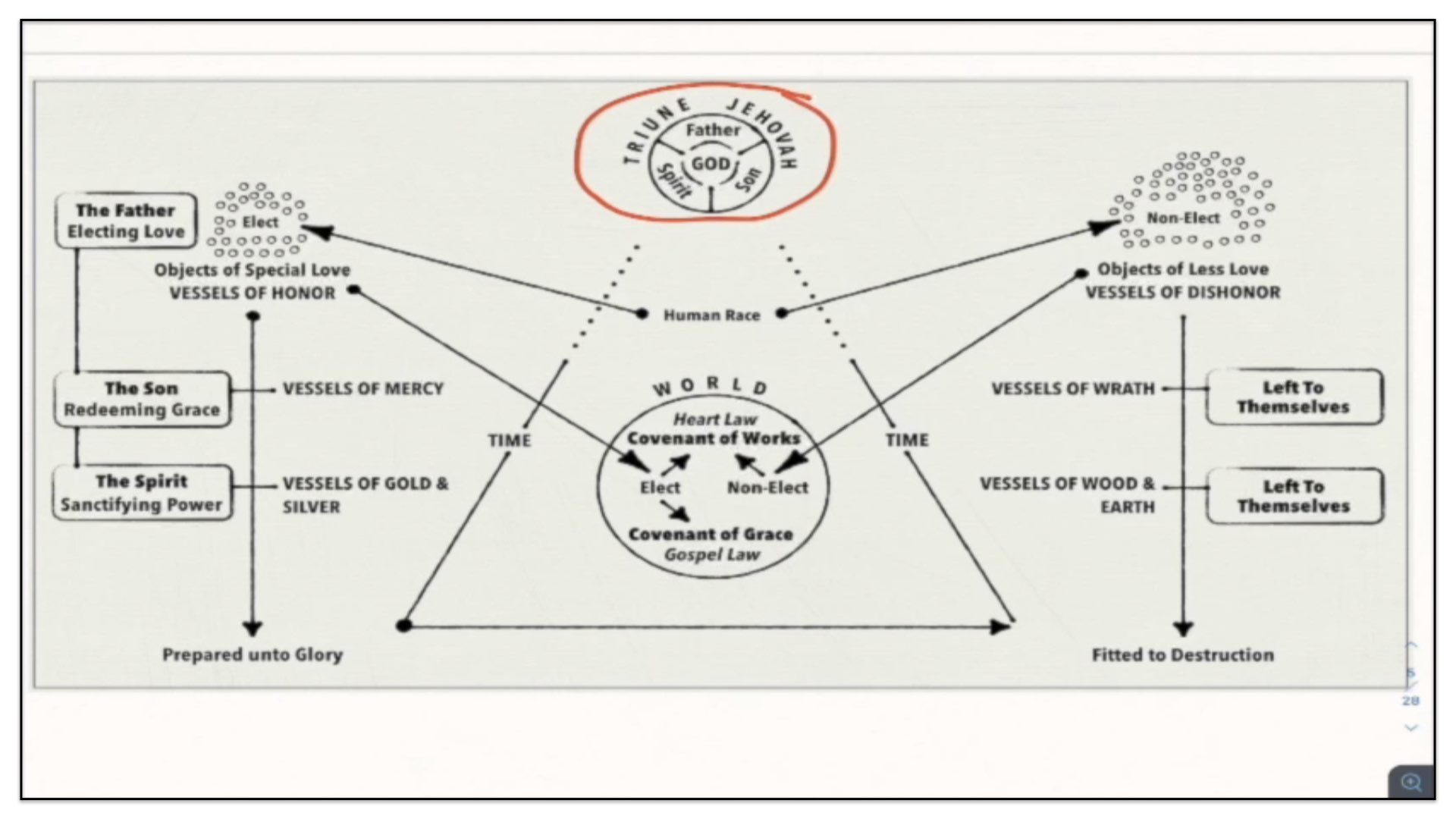
It all begins with the Triune Jehovah who from eternity drew up a blueprint for all that He would do in time and creation. So what we now look at in this diagram is not the actuality of what comes to pass, but rather, the blueprint of what God would bring to pass.
The Electing Love Of God The Father
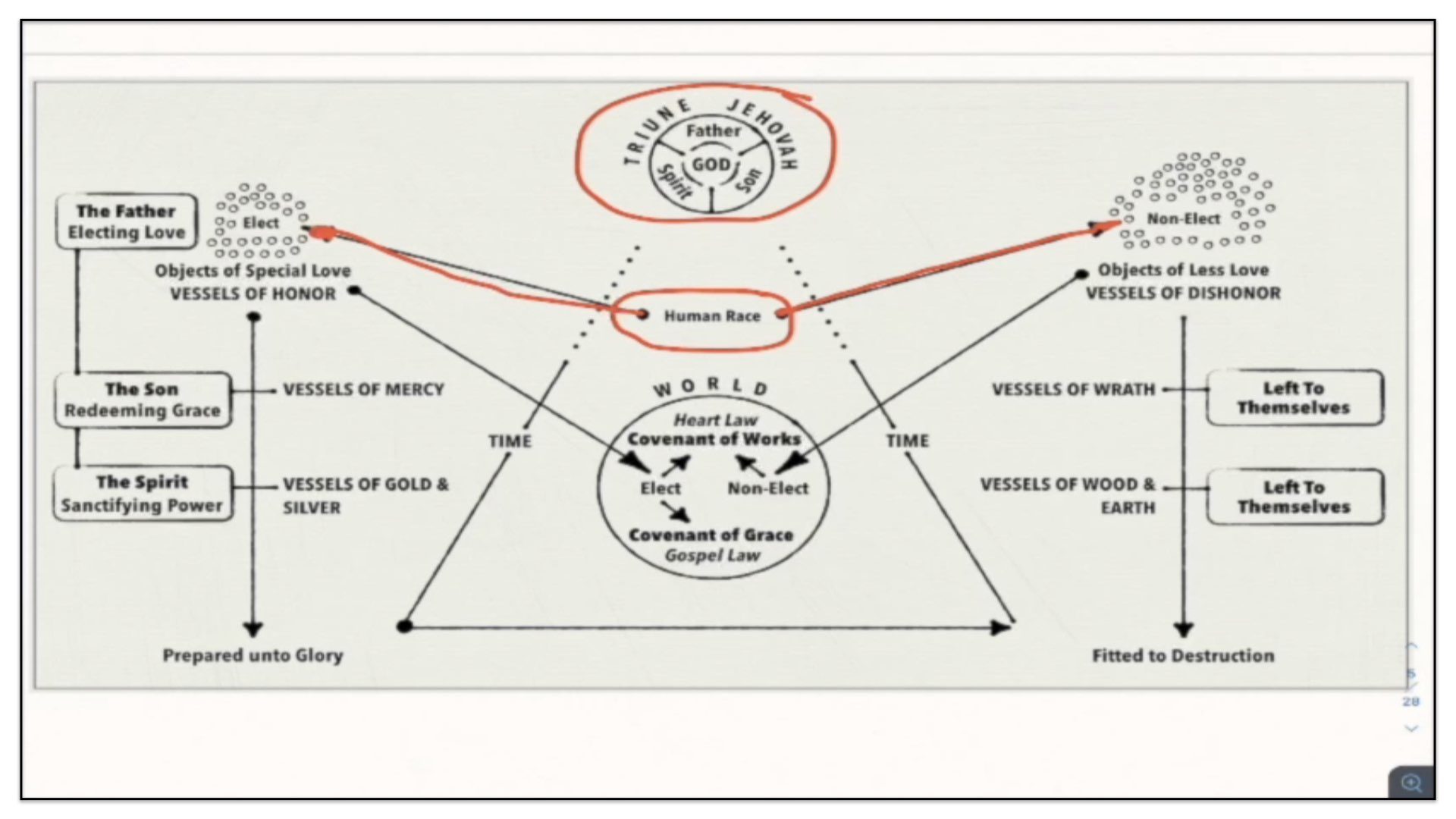
And the blueprint begins with God the Father envisioning the whole mass of the human race, out from which He set some persons apart as special objects of His love. They’re called His elect people, His spiritually elect people, and they are identified in scripture as the vessels of honor. The other persons of the human race the Father set aside as objects of less love. They’re called in scripture the reprobate but we sometimes refer to them as the non-elect, and they are identified in scripture as the vessels of dishonor.
The Covenant Of Works
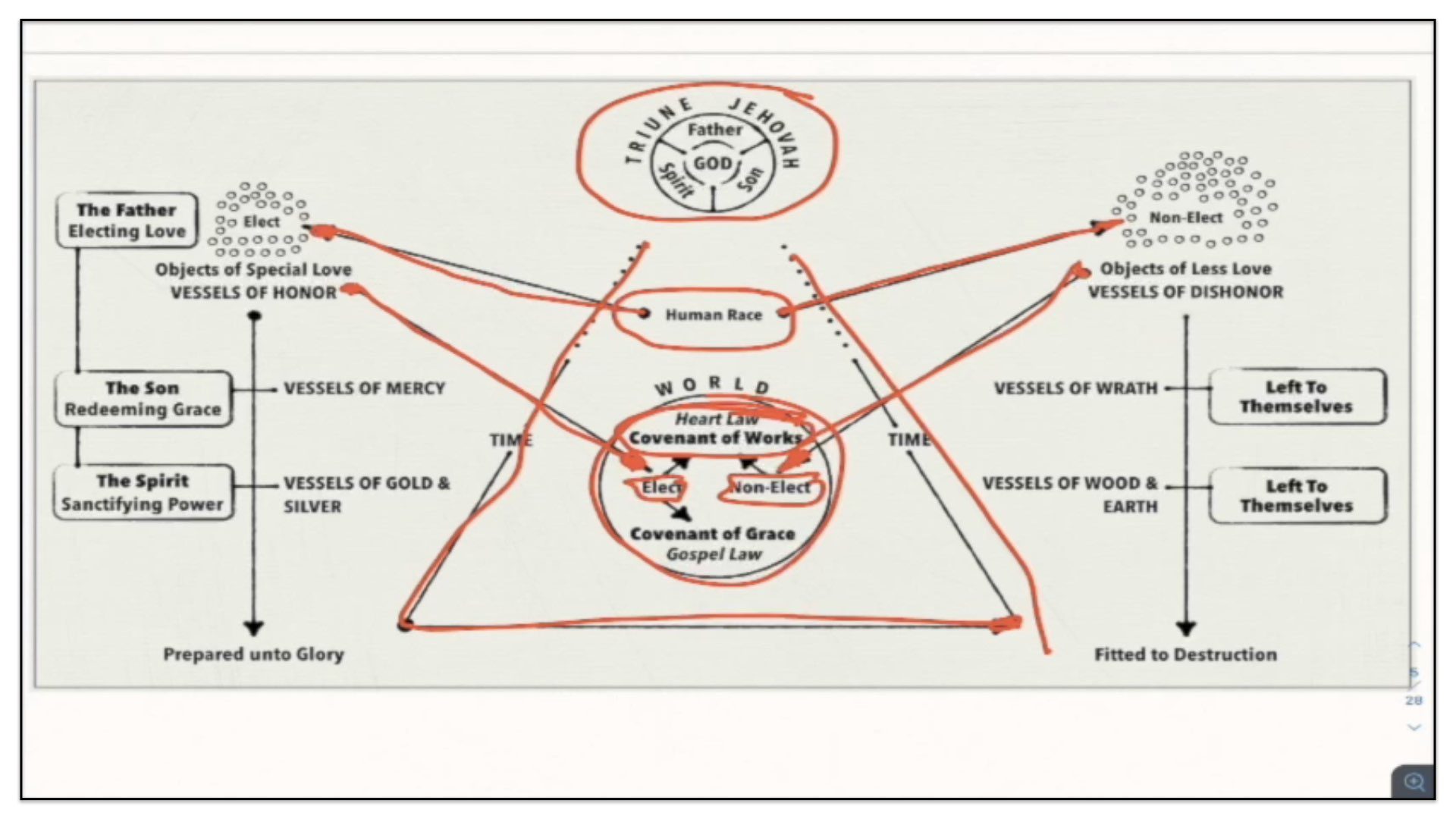
Having made this choice, the Father then determined how He would bring the entire human race into existence. It would be in a time continuum and a purpose built world. And both the non-elect and the elect would be brought into this world. It pleased the Father that He would establish with the first man a Covenant of Works, which would give to the human race the authority to have a relationship with Him. And so God inscribed upon the first man’s heart a law, a heart law—to love God supremely; to love his neighbor as himself. And God required of Adam, the first man, to perfectly obey that law. Now, the transgression of a law is sin. And Adam transgressed this law, thereby committing sin against God, severing his relationship with God and bringing himself under the curse of the Covenant of Works, which is death and condemnation. And because God appointed Adam to serve as the federal head of the human race, so all sons and daughters born with an earthly father are born in this world, I should rather say, conceived in sin and shaped in iniquity. Now this is true for the elect and the non-elect.
The Reprobation Of The Non-Elect
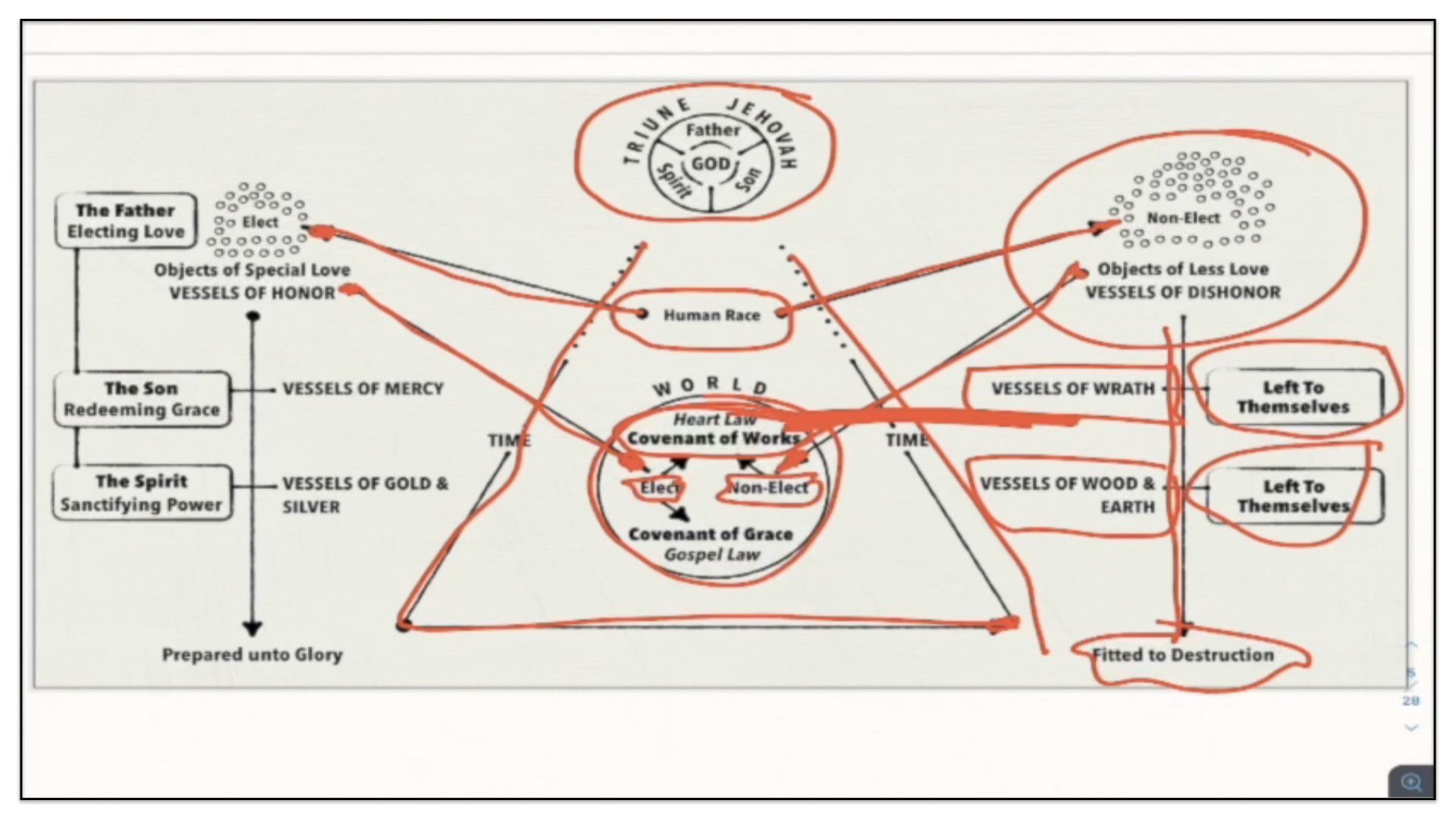
And according to God’s blueprint for His plan of the ages, it pleased the Father to then leave the non-elect in their sins, fitting them to destruction. And these persons are only under the Covenant of Works. And that is why God condemns them. It is because they have transgressed the law upon their hearts. And these persons are then made the vessels of wrath and the vessels of wood and earth.
The Salvation Of The Elect
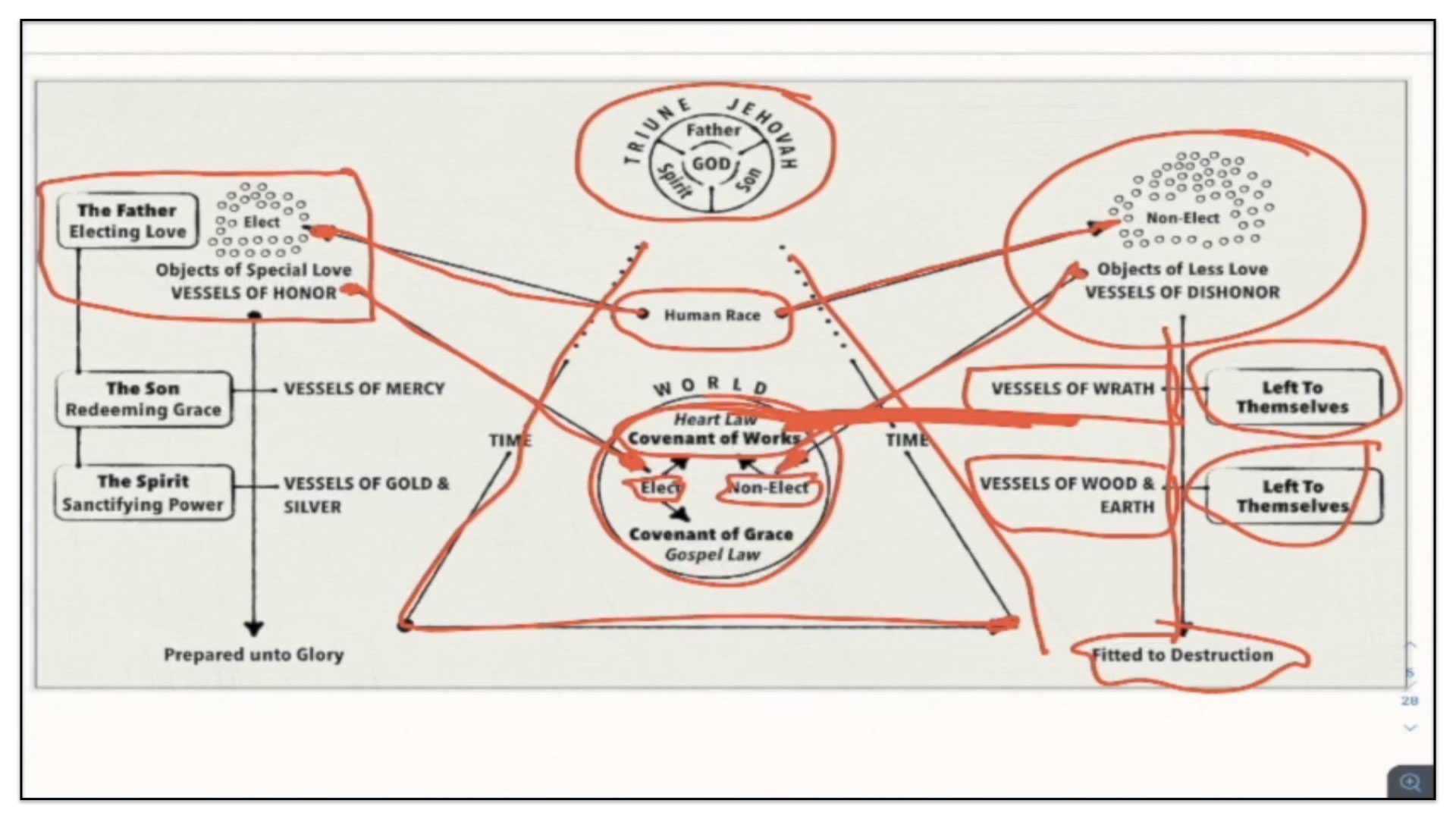
However, because God the Father had already set His electing love upon the elect, He chose to save this people from their sins and it’s a two-fold salvation.
The Redeeming Grace Of God The Son
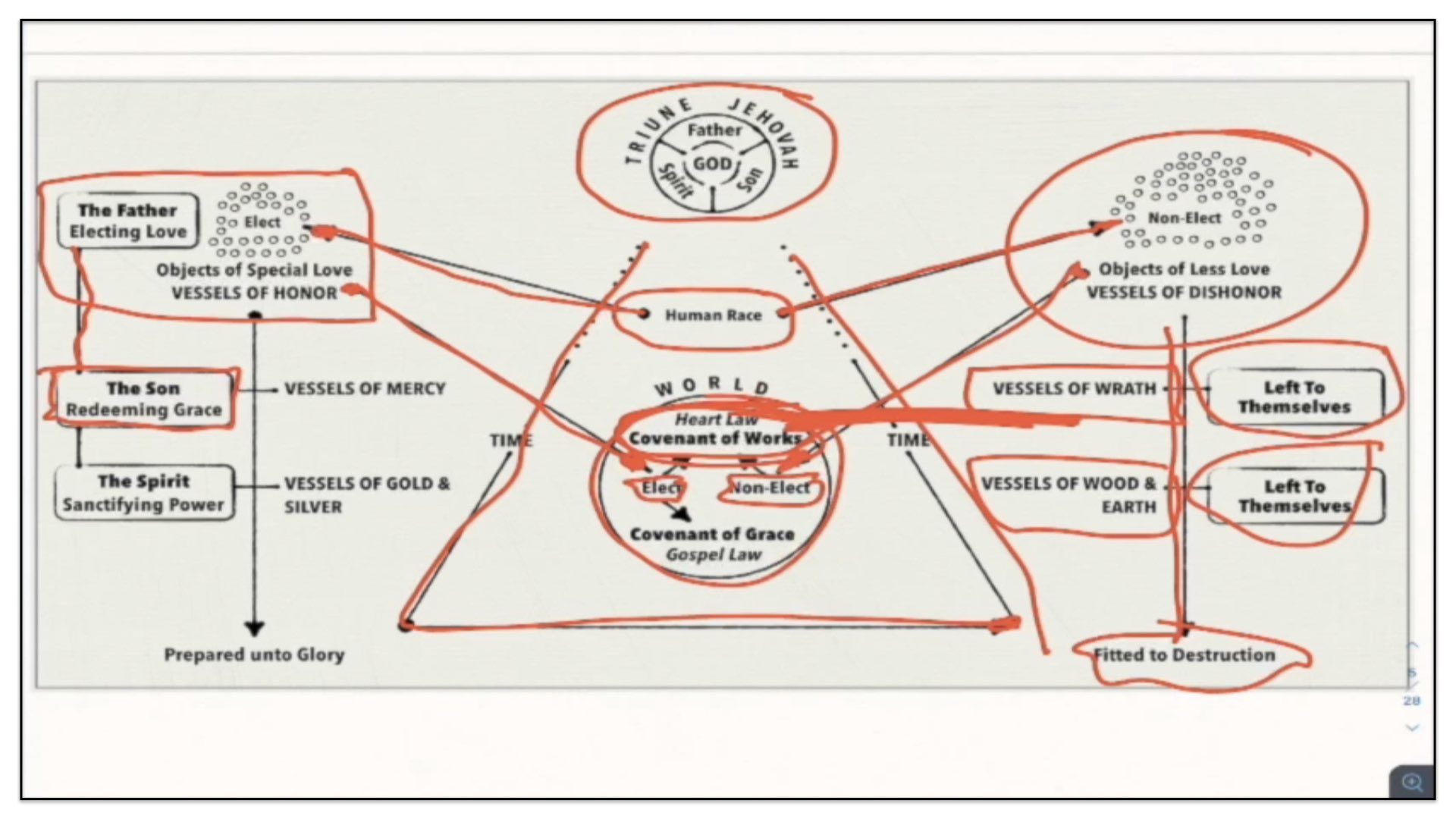
The first, the Father gave His elect people to His Son, appointing His Son to redeem them from their sins. The Son of God received the elect to Himself and set His everlasting love upon them and agreed to redeem them. Insomuch that in the fullness of time, the Father would send forth His son, made of a woman, made under the Covenant of Works, in order that Christ, the Lord Jesus Christ, might by His perfect obedience, keep the law inscribed upon His heart, as well as offer Himself a sacrifice to God and a substitute for His people, through His atoning blood and death at Calvary. In this way God the Father justifies, or pronounces righteous, makes righteous, His elect people. It is all in and through the redemptive work of the Lord Jesus Christ.
The Sanctifying Power Of God The Spirit
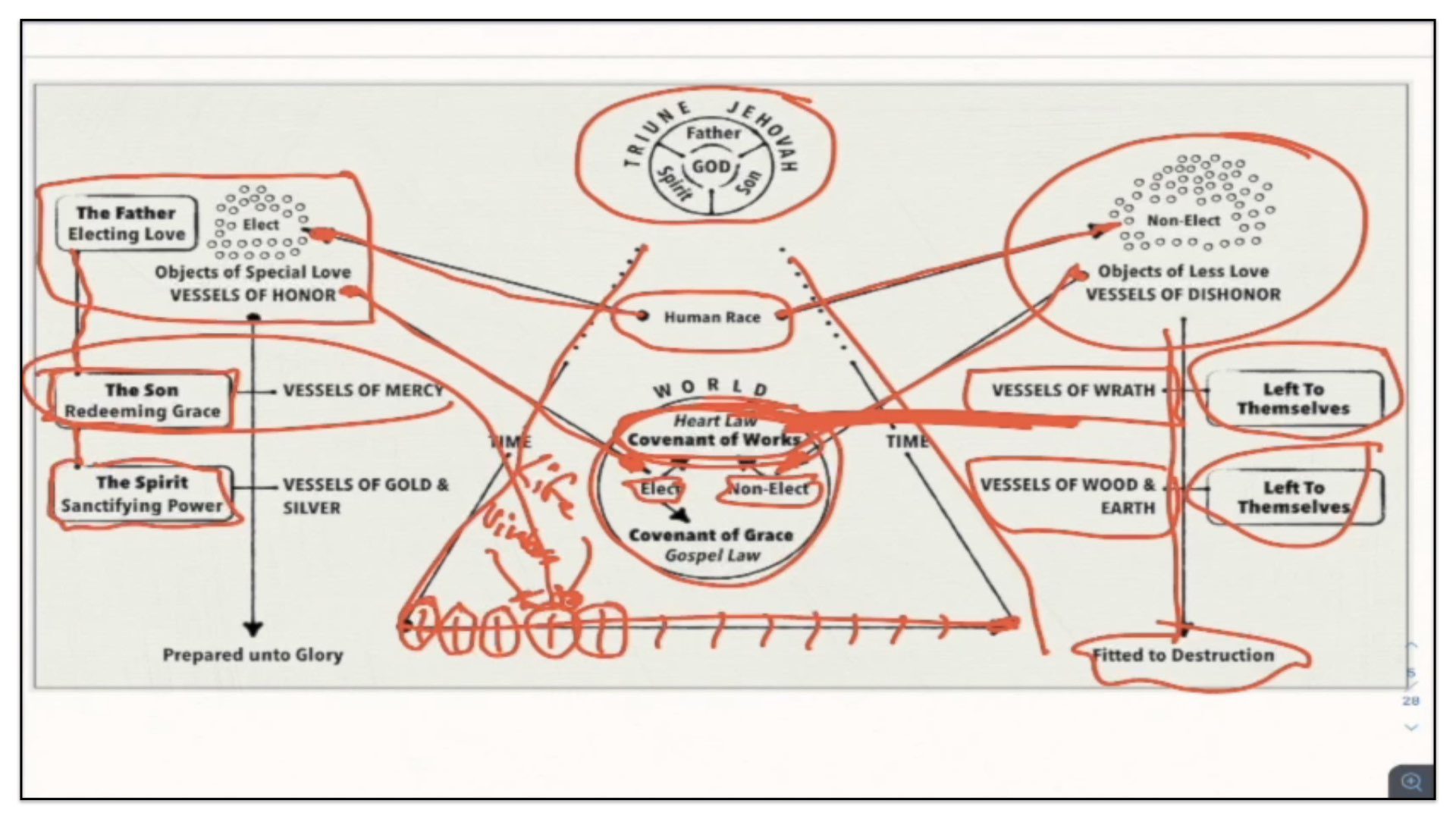
But then God the Father and the Son were pleased to give the elect to the Holy Spirit. The Spirit of God received them to Himself. He set His everlasting love upon them and the Spirit of God agreed to sanctify the elect. And the work of sanctification begins with regeneration, or the new birth. Insomuch that whenever God’s elect people are brought into this world throughout the course of history, the Spirit of God will regenerate those souls, uniting those souls with the Lord Jesus Christ, whereby the life of Christ flows into the soul making them alive unto God, and the virtues or graces of Christ flow into the soul, among which is saving faith, enabling the sinner to now believe savingly on Christ.
The Covenant Of Redemption, Or, The Covenant Of Grace
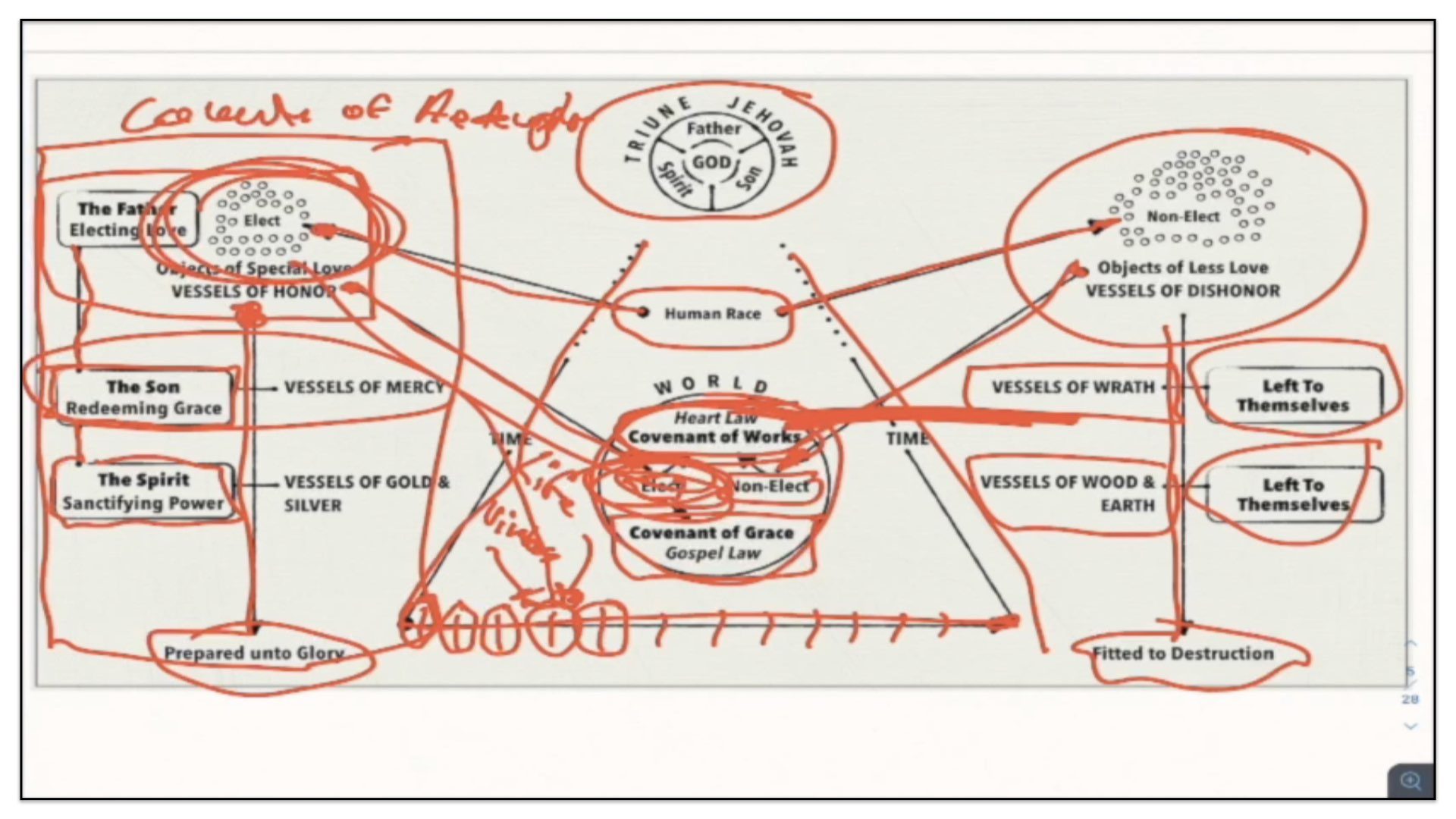
And what we are referring to here is what prepares the elect unto glory, or heaven. And this is called the Covenant of Redemption. But it’s also called the Covenant of Grace. They are one and the same thing. This Covenant of Redemption or this Covenant of Grace is a covenant the Father, Son and Spirit make between themselves on behalf of the elect, wherein the Father, Son and Spirit do all that’s required for the salvation of their elect people. That’s what we call salvation by grace and grace alone.
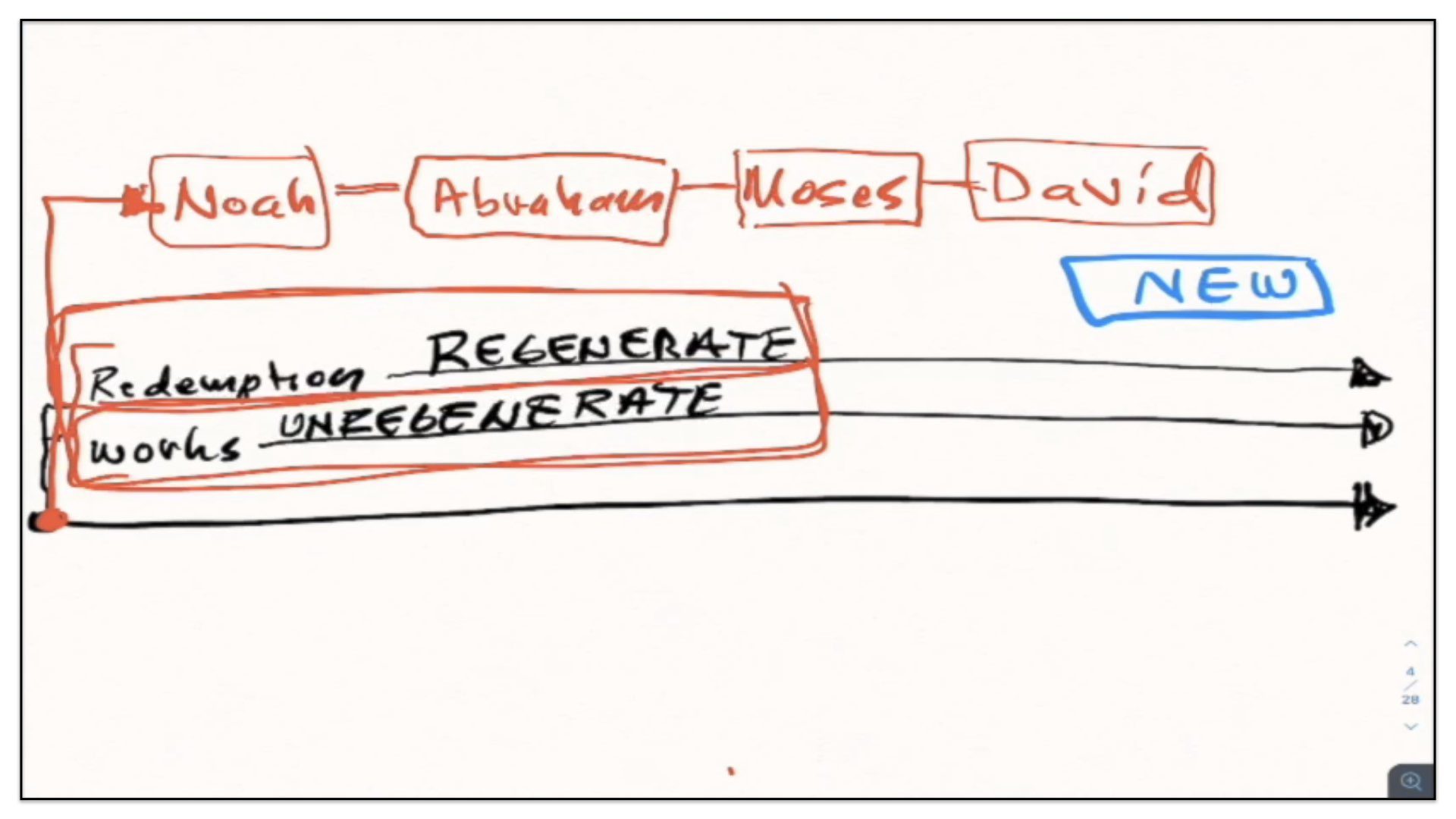
Now you see, that’s my understanding of the Covenant of Redemption and the Covenant of Grace. And if I bring you back now to the main notes for this study, this is the Covenant of Redemption and the Covenant of Works and how they fit together in the grand scheme of God’s master plan for the ages.
An Explanation Of A Conditional Covenant Of Grace Espoused By The Presbyterians And The Reformed Baptists
They Believe There Are Three Main Covenants
However, that is not how the Presbyterians and the Reformed Baptists understand it. Please watch this now. The Reformed Baptists and the Presbyterians believe there are three major covenants of the Bible. If I can just draw another timeline to illustrate this for you.
The Covenant Of Redemption, Relegated To The Backdrop Of History
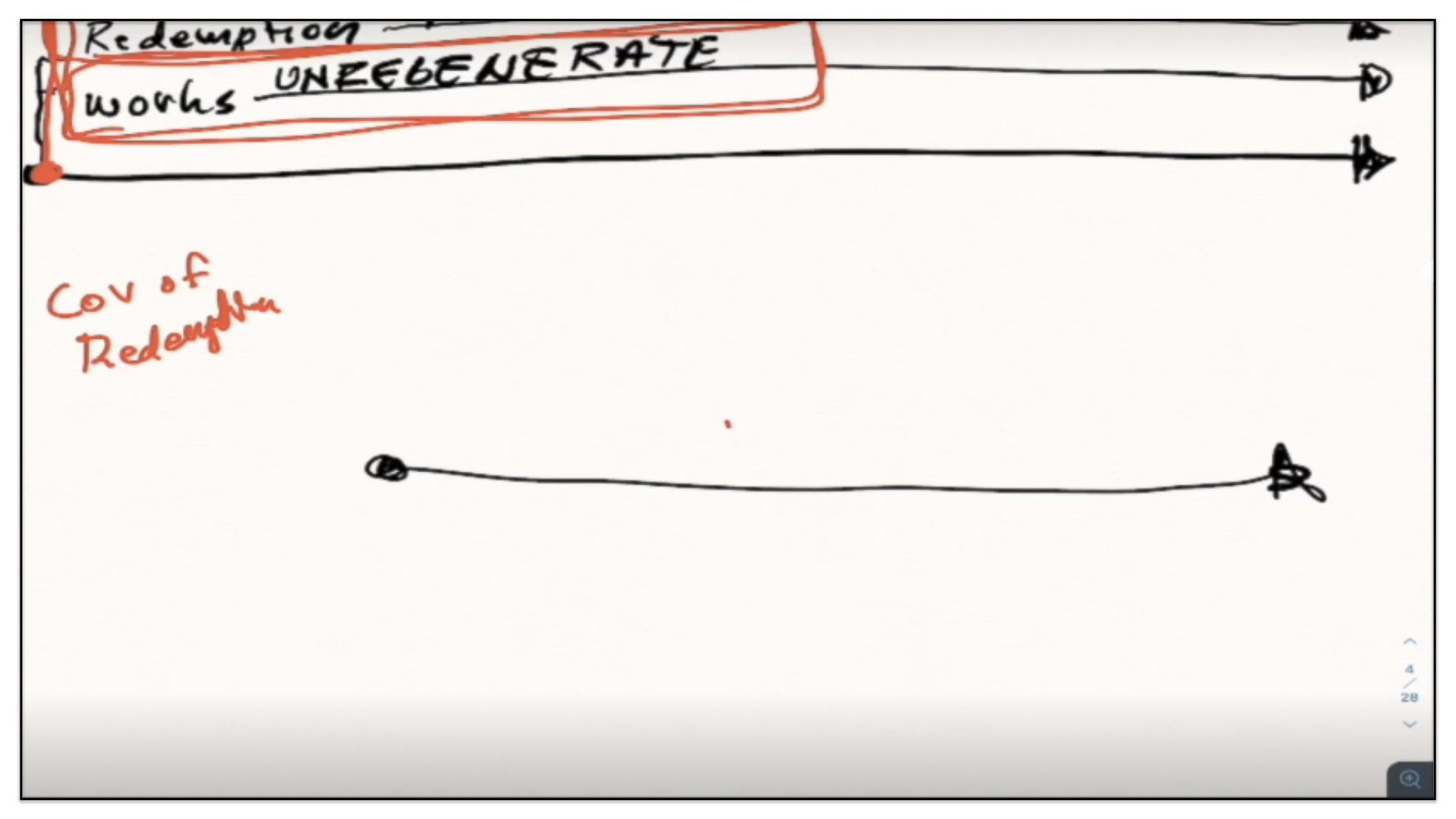
The first of these three covenants is what the Presbyterians and the Reformed Baptists call the Covenant of Redemption, and their understanding of the Covenant of Redemption is similar, though not the same, but similar to what I’ve just presented to you in the previous notes according to this overview.
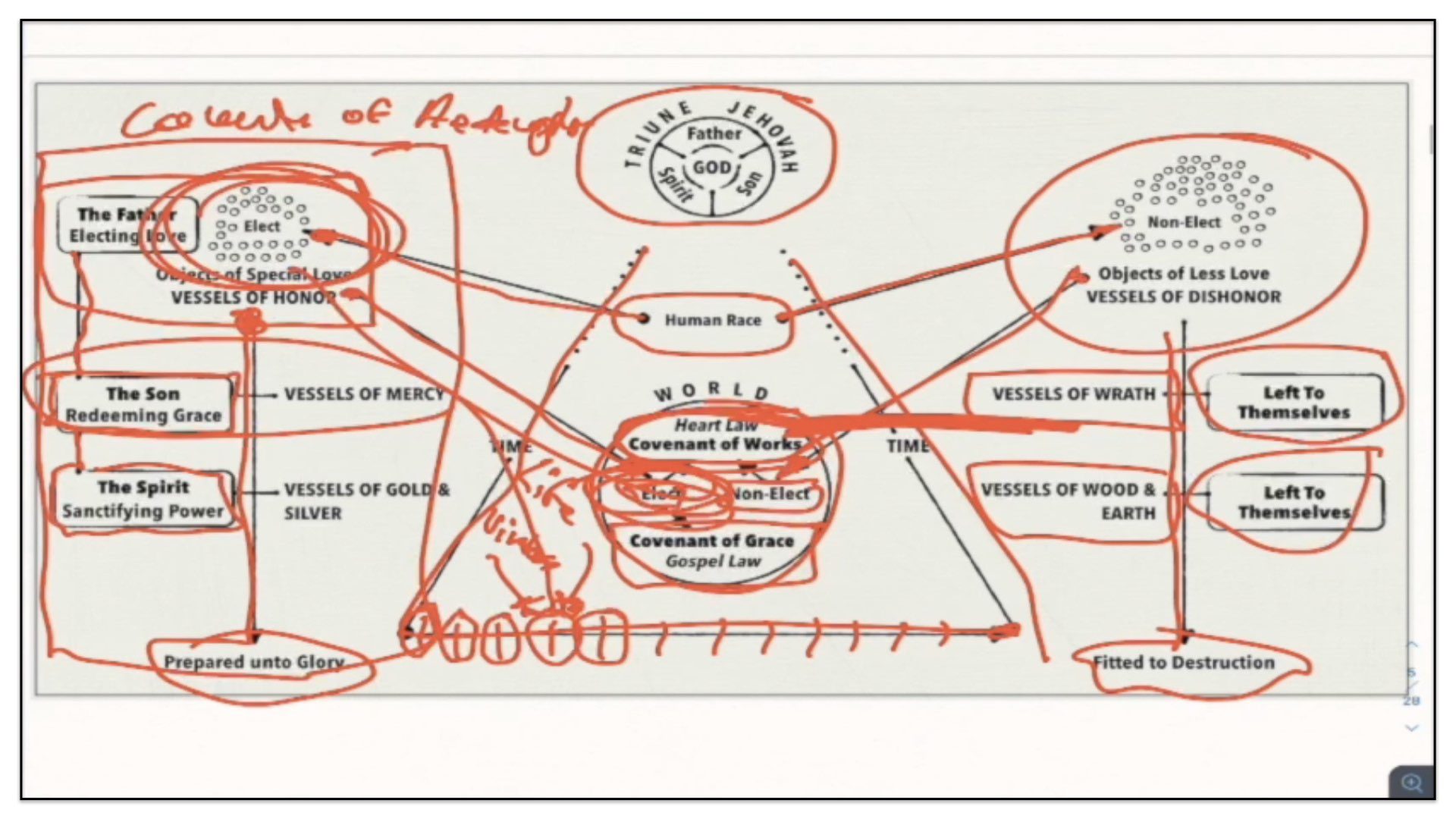
I say it’s similar because this presents the teachings in a very precise and methodical way as presented by the Apostle Paul in Romans 9. Whereas the Presbyterians and the Reformed Baptists, they usually interpret these things according to Paul’s statements in Ephesians chapter 1.
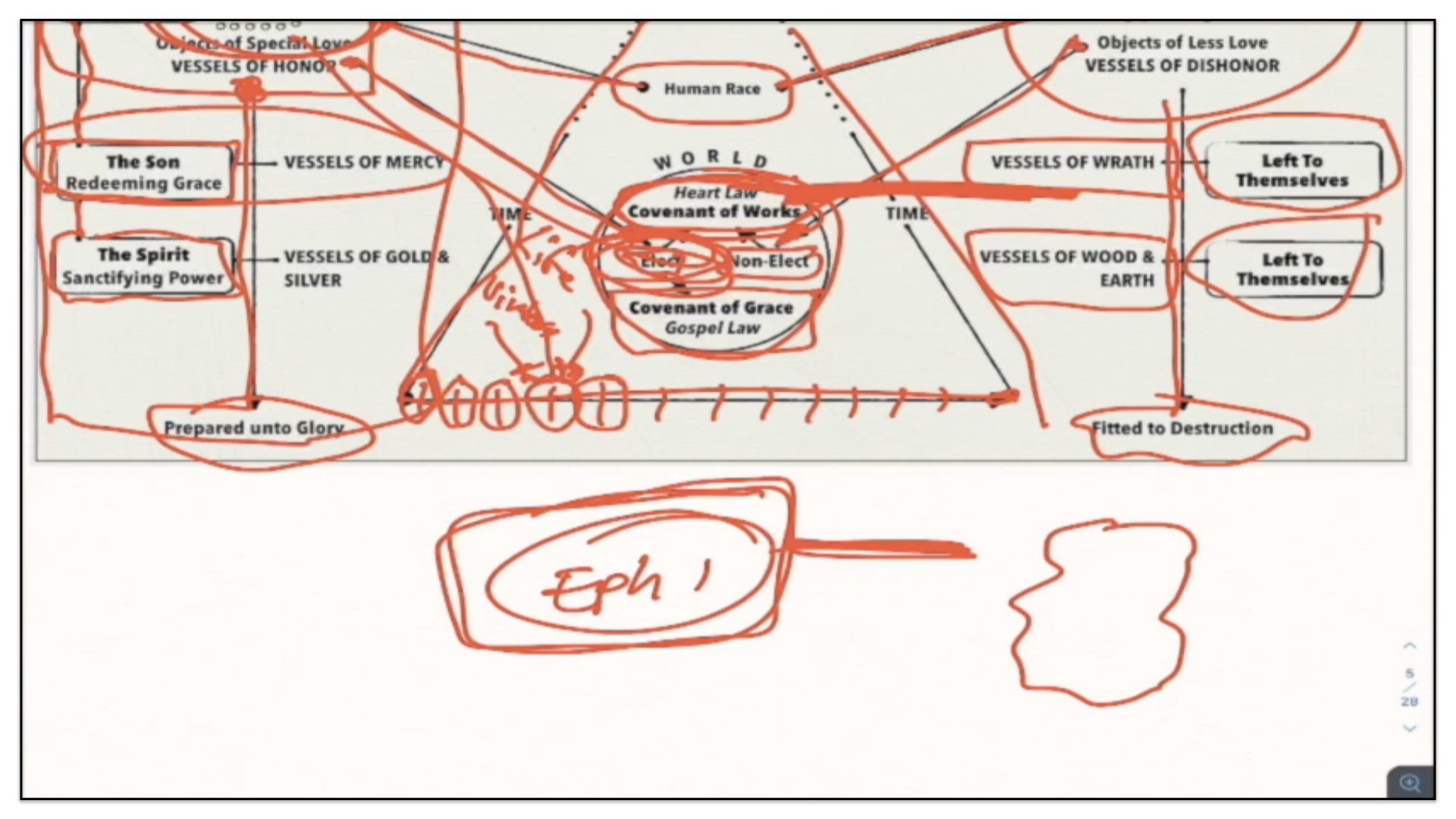
But you see, Ephesians chapter 1 was never intended by Paul to give an outline of God’s master plan for the ages. But the Presbyterians and Reformed Baptists believe that this passage does give an overview of God’s master plan for the ages and therefore based on that, they interpret the Covenant of Redemption in their own little way. And it differs from Paul’s teachings on the subject in Romans 9. If, however, you do as I have done, you take the explanations of Paul in Romans 9, this Framework of Sovereign Grace, and then apply that to the teachings of Ephesians 1, then Ephesians 1 can properly be interpreted.
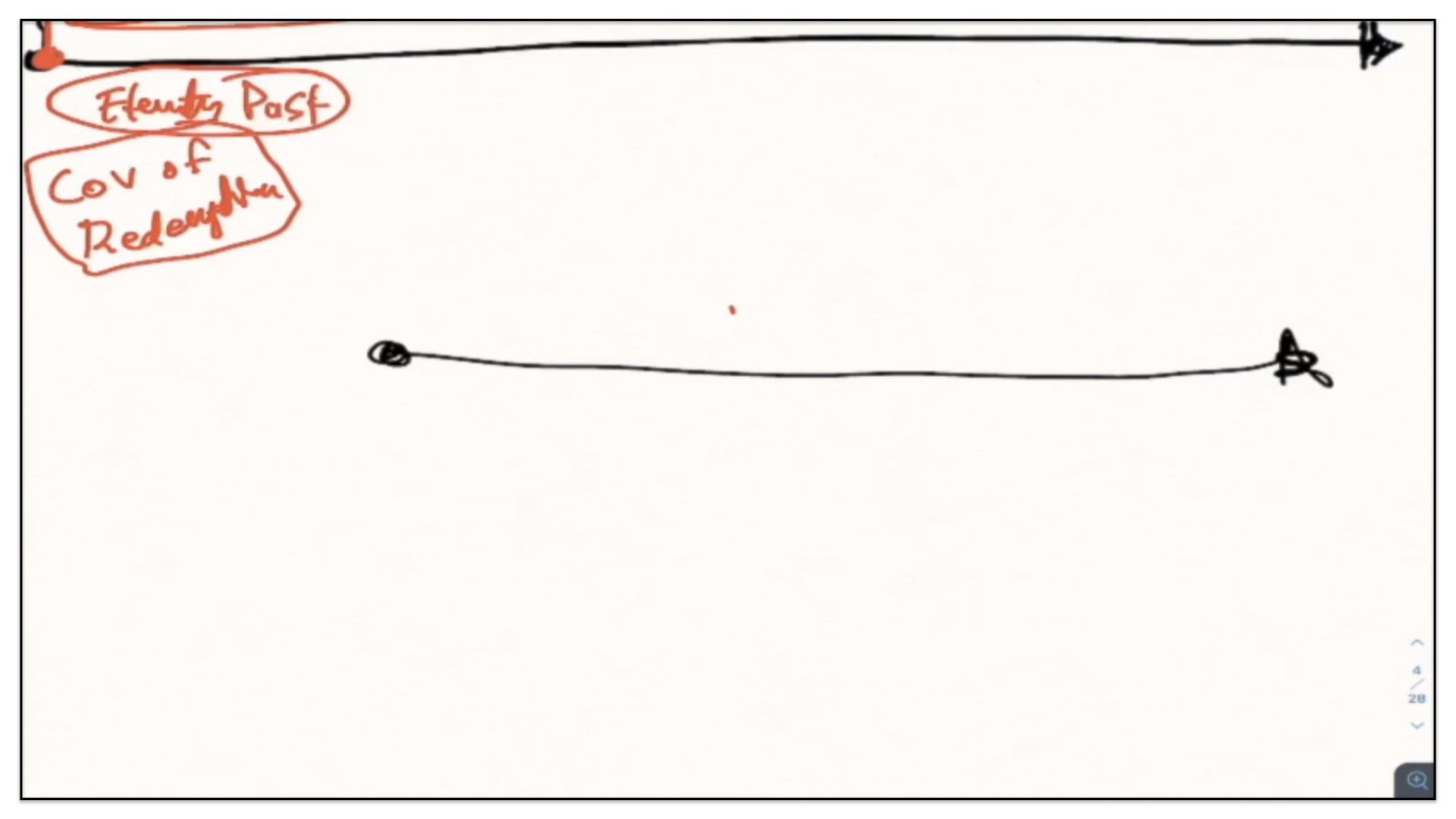
Now coming back then to this timeline of the Presbyterians and the Reformed Baptists, they do believe that this Covenant of Redemption between the Father, Son and Spirit, they believe it occurred in what they call eternity past. Now, of course, I don’t believe in eternity past.
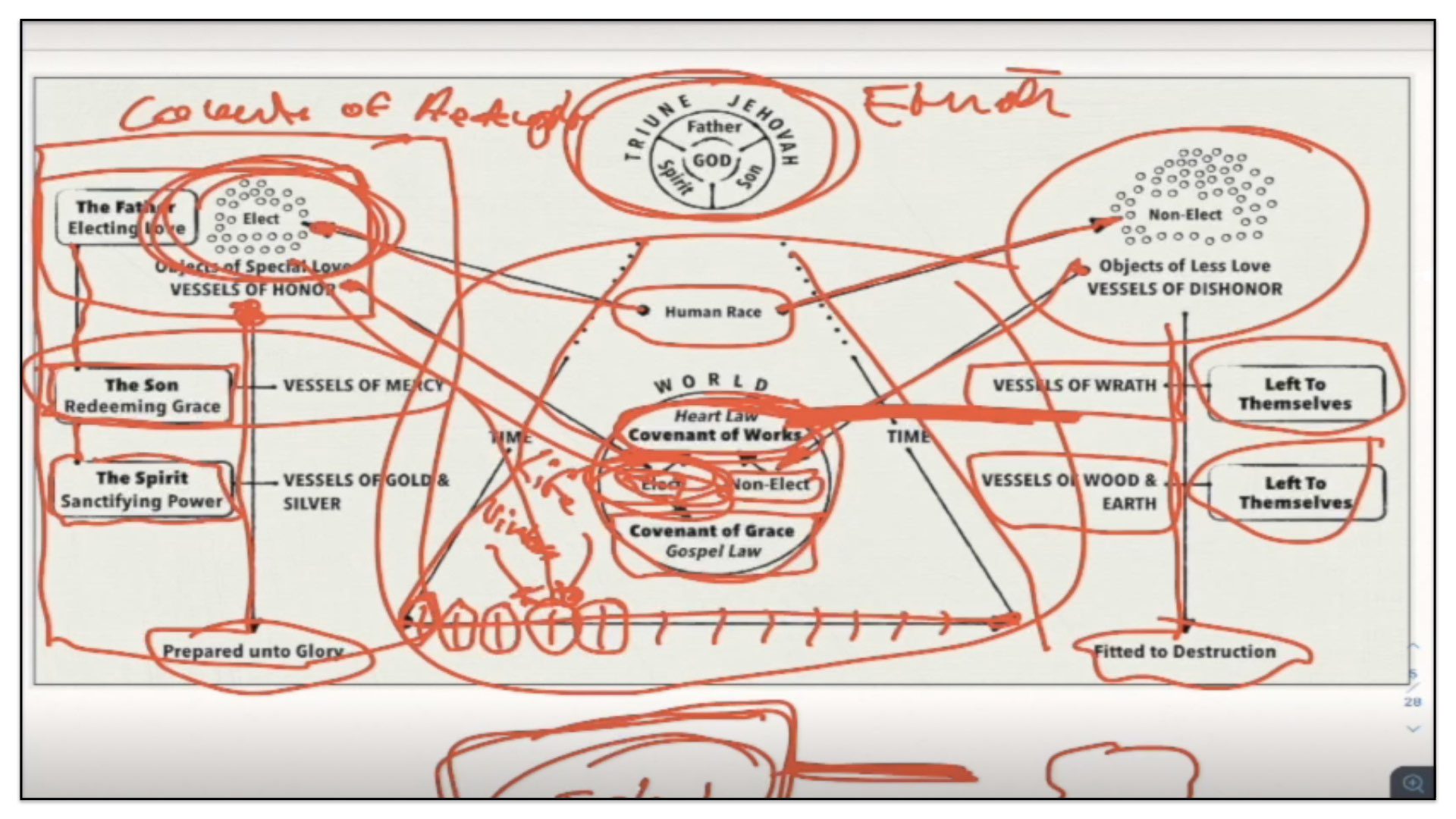
I believe God is eternal and He exists outside of time.
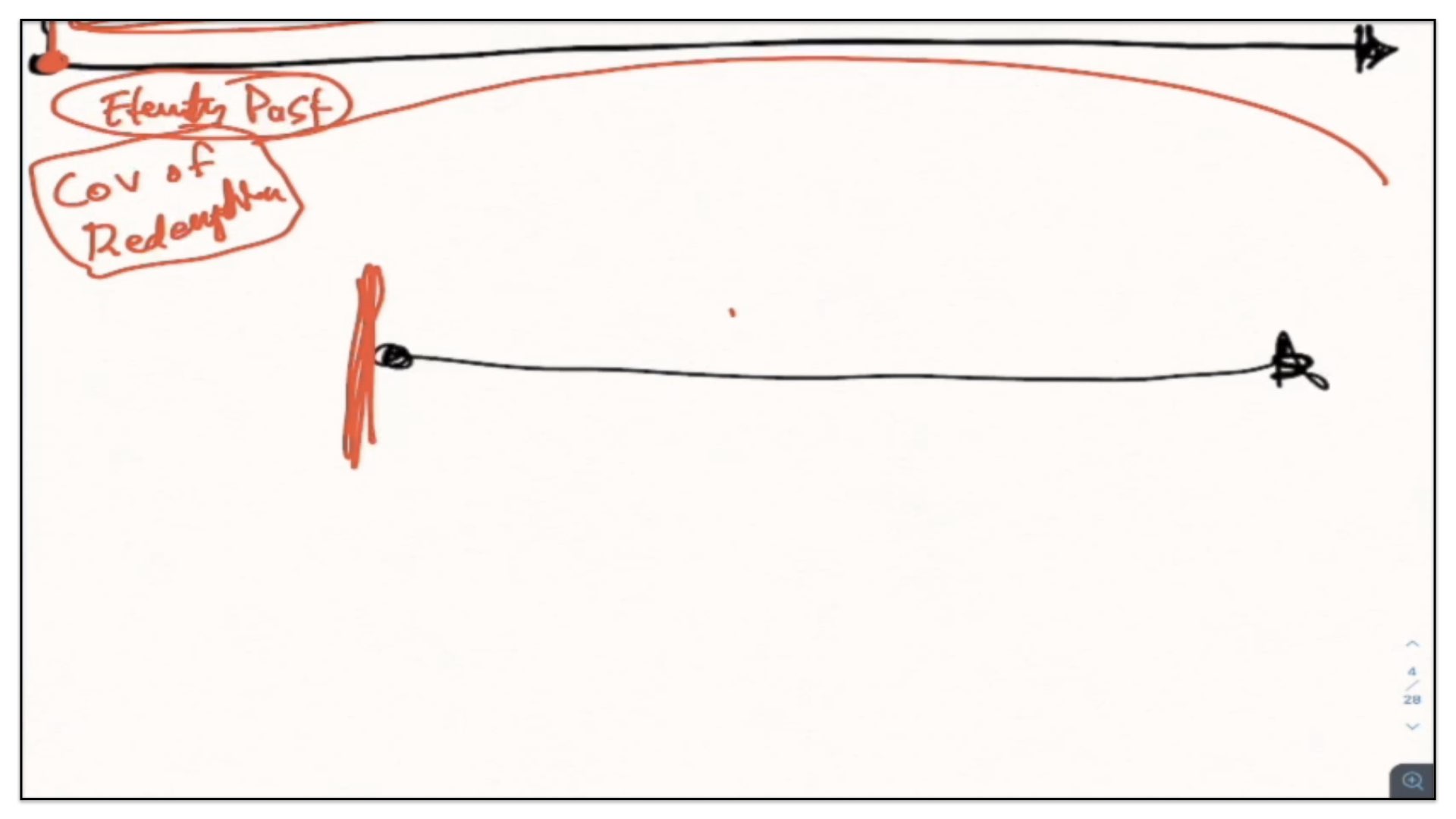
But for the Presbyterians and the Reformed Baptists, they use this language of eternity past, placing God Himself, the eternal God, along a timeline. Well, so be it. That’s how they view it and therefore the Covenant of Redemption exists before the foundation of the world. And they view the Covenant of Redemption to be a backdrop to history. It’s a kind of landscape for everything that’s going to take place in time. But they say, the Covenant of Redemption never penetrates time. It remains eternal, outside of time. In order to understand, they say, what God does in time, we have to look at the other two major biblical covenants.
The Covenant Of Works Made With Adam Prior To The Fall, Requiring Of Him Perfect Obedience To The Heart Law
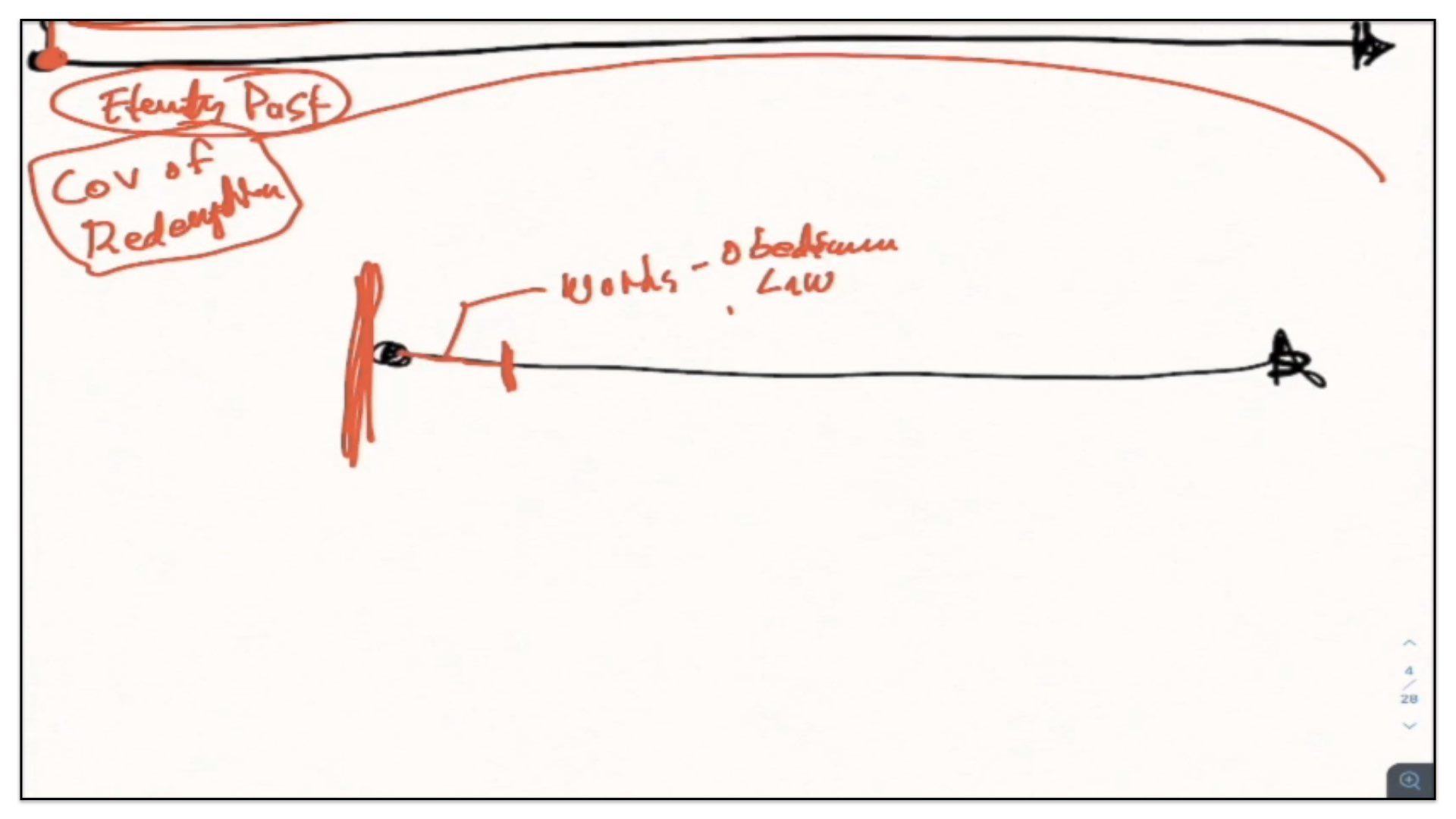
The first of these covenants they say was made with Adam before he sinned, and they call this the Covenant of Works. Now what they say about the Covenant of Works, I pretty much agree with. I don’t need to go into those details again. In essence, they believe the Covenant of Works is conditioned upon the perfect obedience of man to the law inscribed upon the heart.
The Covenant Of Grace Made With (Or Promised To) Adam After The Fall, Requiring Of Him Saving Faith In The Redemptive Work Of Christ
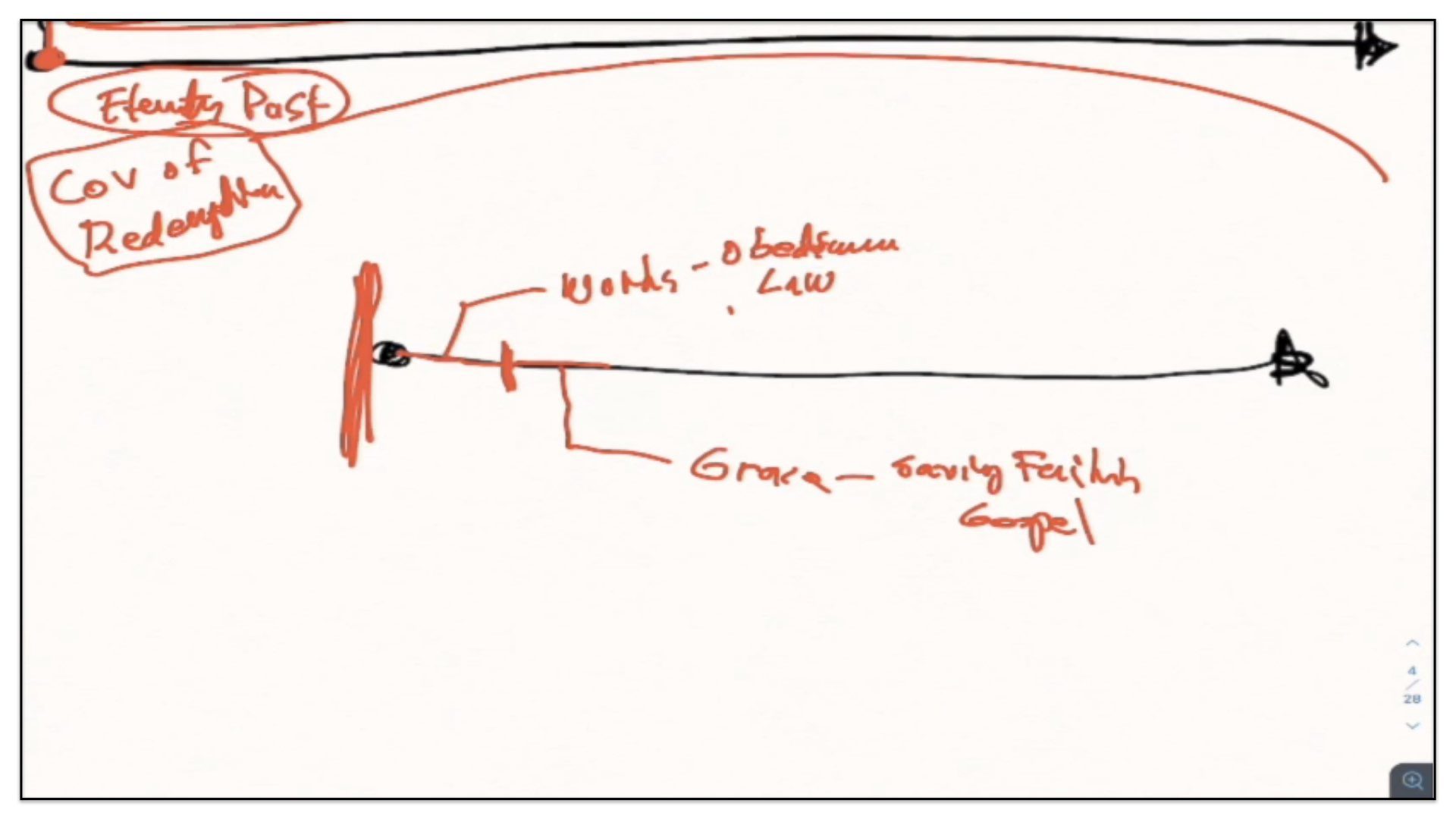
But then, and here is the big difference, they then say that after Adam sinned, God established a new covenant, a Covenant of Grace, a Covenant of Grace which is different from the Covenant of Redemption. A Covenant of Grace which God makes with sinners, not on behalf of sinners, but actually with sinners. An agreement with sinners. And the conditions for this agreement is saving faith in the gospel. It’s a conditional Covenant of Grace.
Their Distinction Between Law And Gospel Is Based On This Dichotomy Of Obedience To The Law On The One Hand And Saving Faith In Christ On The Other
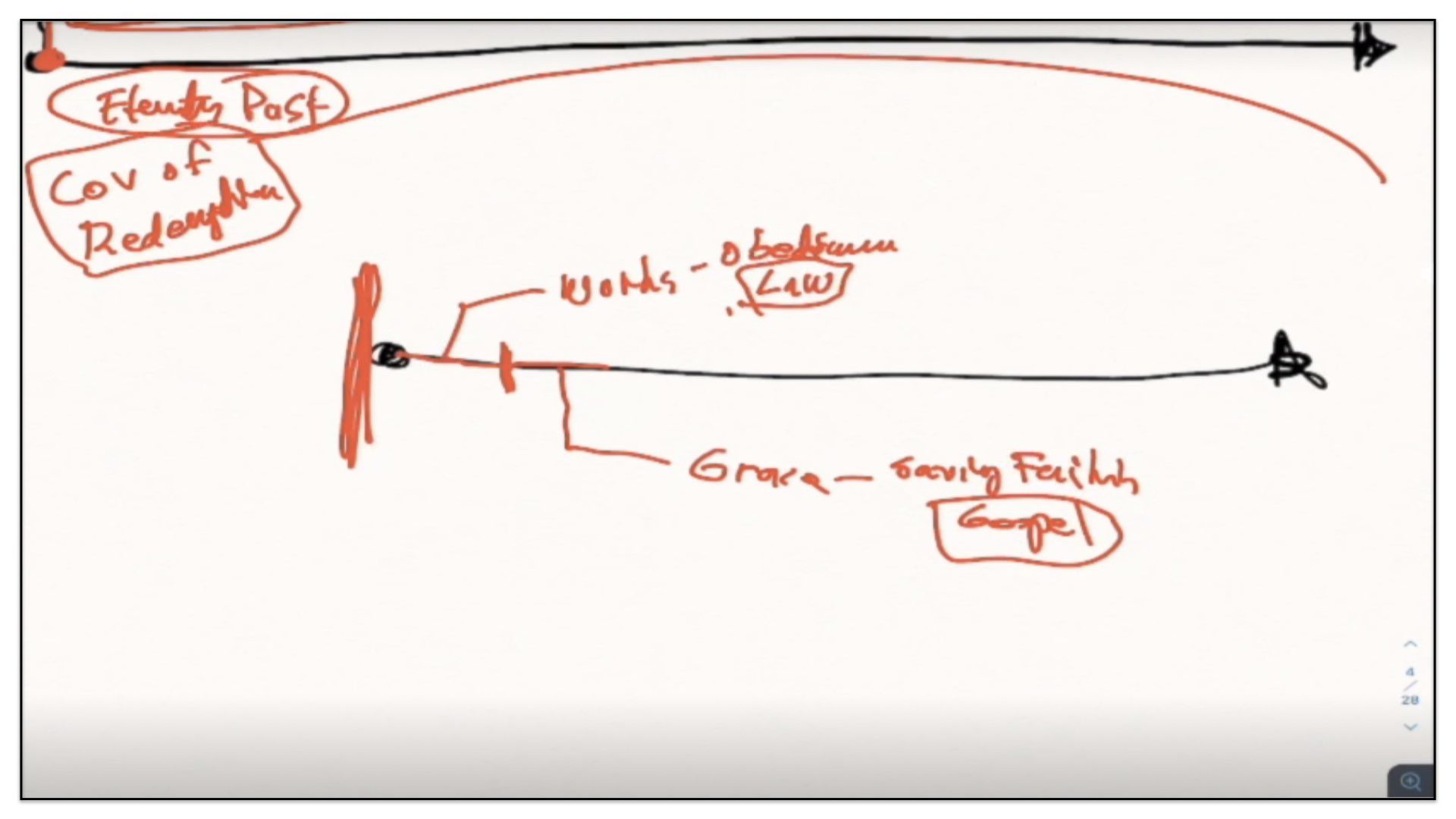
And you’ll often hear the Presbyterians and the Reformed Baptists speak about the distinctions between law and gospel. And this is what they’re referring to. They’re referring to a conditional Covenant of Works and a conditional Covenant of Grace. One of which is law, the other is gospel.
Although They Distinguished Between Law And Gospel, Yet They Impose Upon The Unregenerate Privileges Belonging Only To The Regenerate, And Impose Upon The Regenerate Duties Belonging Only To The Unregenerate
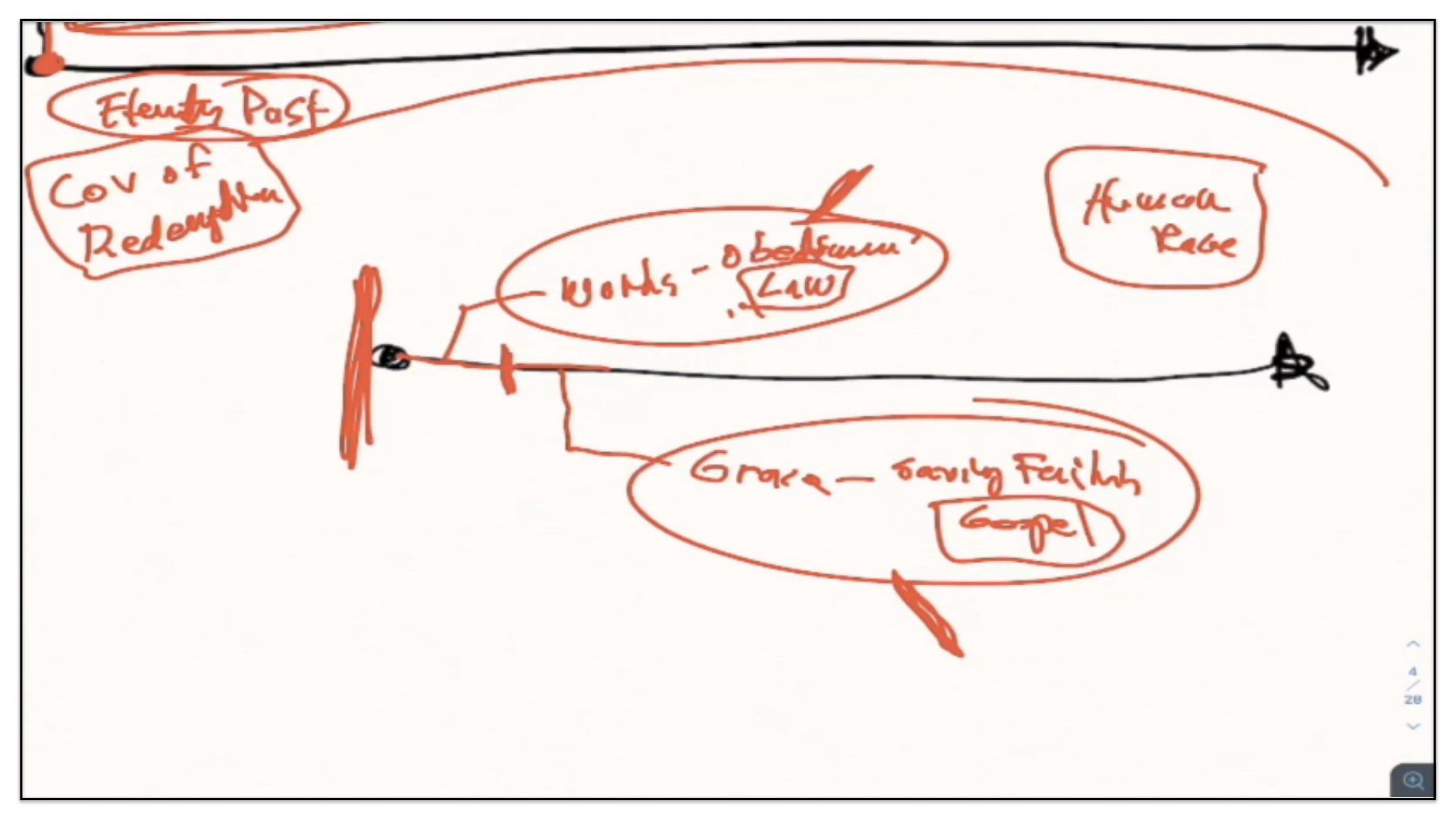
And they have very mixed up views because they believe ultimately the entire human race is subject to God simultaneously to both of these covenants. They believe the unregenerate sinner is accountable to God to perfectly obey the law on his heart, which they say, the sinner can’t do. But he’s responsible to do it. And they say the unregenerate sinner is also responsible to savingly believe on Christ, and then, when a sinner is born again, it’s the same thing. They say a born again sinner is to savingly believe on Christ and is also to perfectly obey the law inscribed upon the heart, which they say the regenerate sinner is able to do because they’ve been born again and they have a new nature. So they see the entire human race being subject at one and the same time to both of these conditional covenants. In a nutshell, that’s the view of these groups.
While The Traditional Reformed Baptists And The 1689 Federalists Subscribe To A Conditional Covenant Of Grace, Yet They Nurture Different Views On Its Relationship To The Earthly Covenants
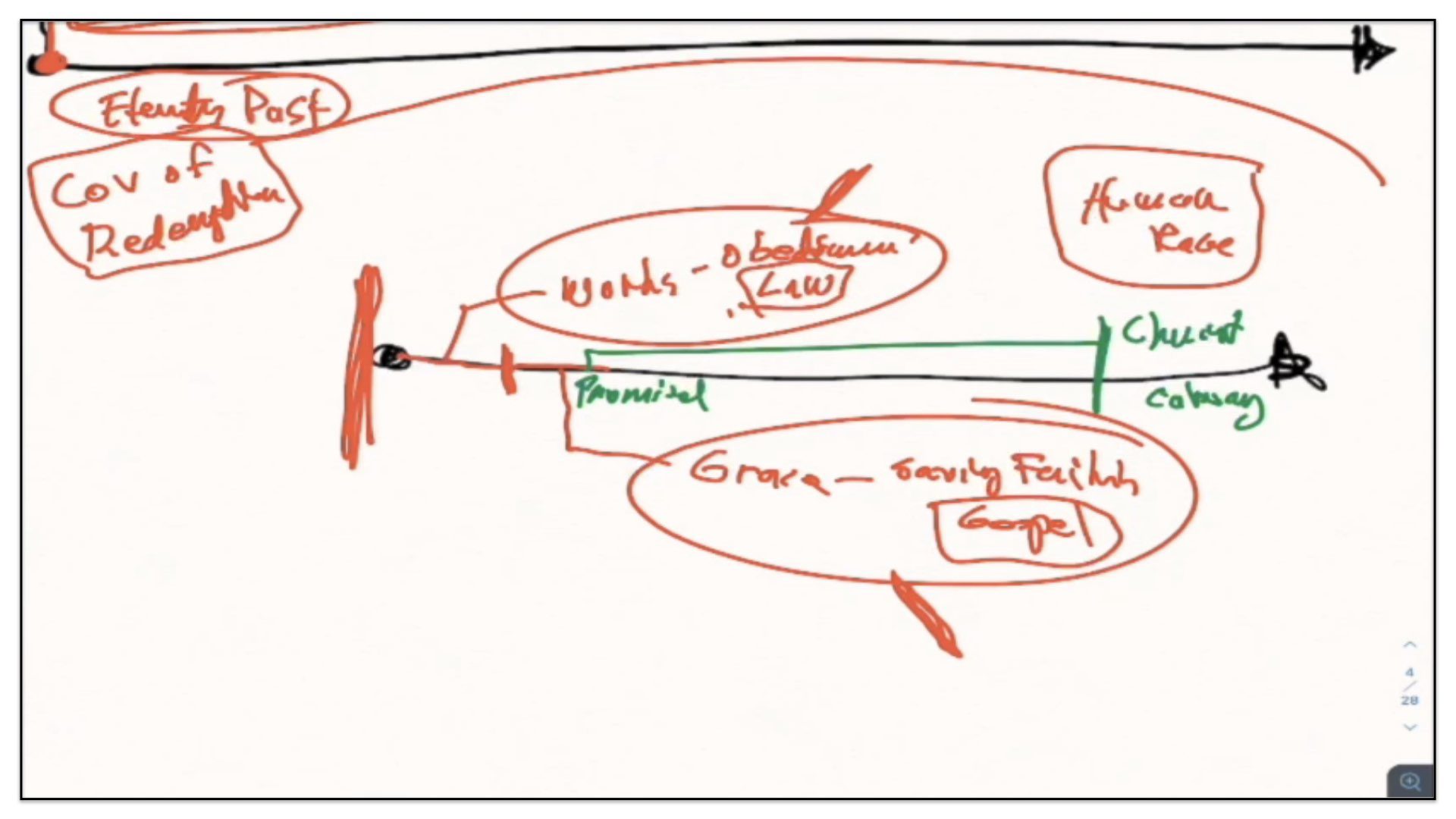
Let me just in passing, just mention to you, because I want to be fair on the subject, the Reformed Baptists are now divided into two major branches. The first branch are the traditionalists, and the traditionalists would believe this view with the Presbyterians. But the second branch of Reformed Baptists would be the 1689 Federalists. And they believe something slightly different. They do believe in a conditional Covenant of Grace, but they believe it was only promised to Adam in the garden of Eden and established with Christ on Mount Calvary when Jesus died. And of course, that does make quite a large difference in covenant theology and how the covenants are arranged and understood. So there’s quite a major difference between the 1689 Federalists and the traditional Reformed Baptists and Presbyterians.
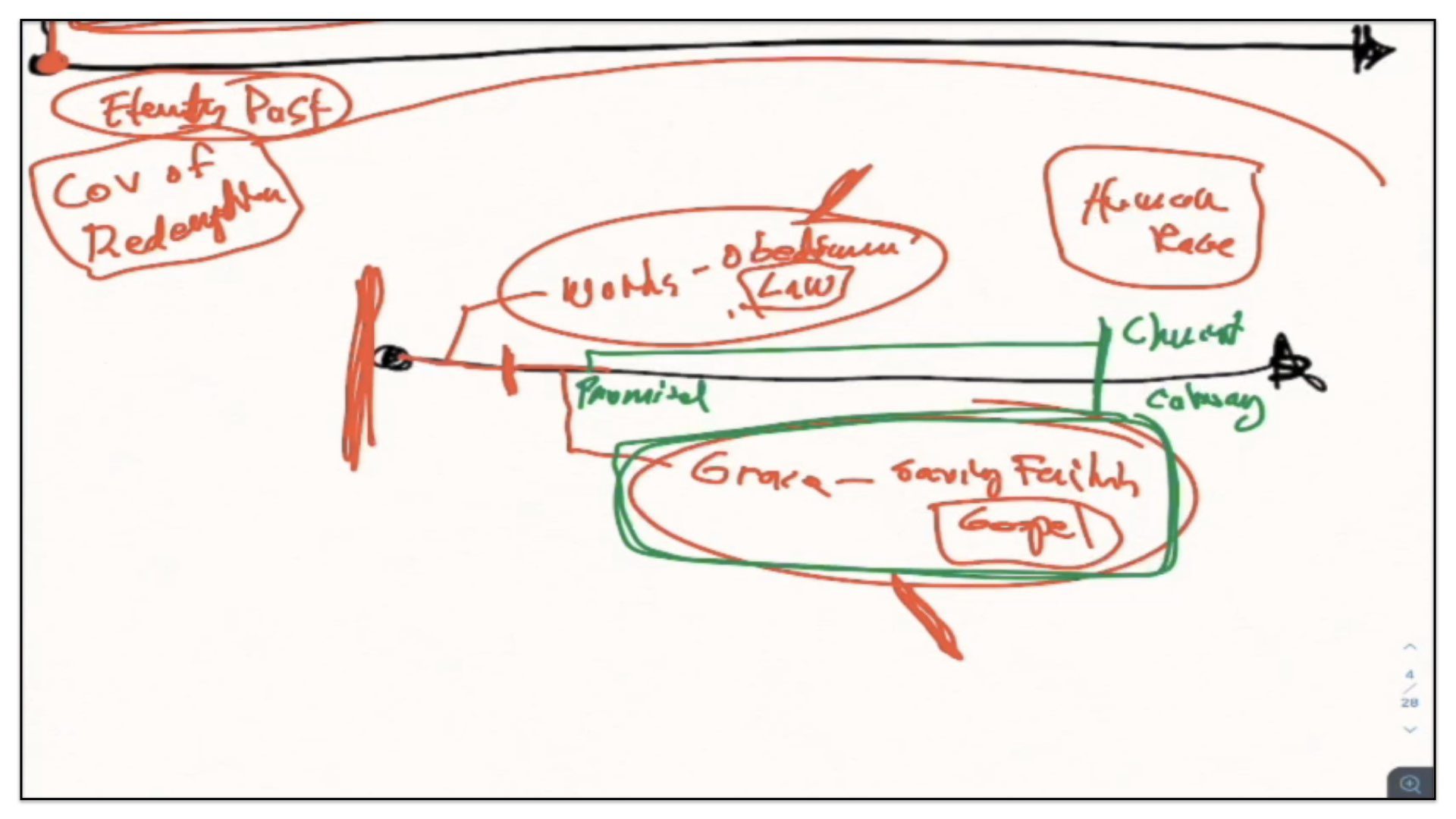
Having said that, for the purpose of this study, the Presbyterians and all Reformed Baptists agree that there is a conditional Covenant of Grace of some kind.
The Pernicious Doctrines Of Duty Faith And The Free Offer Springing Out Of A Conditional Covenant Of Grace
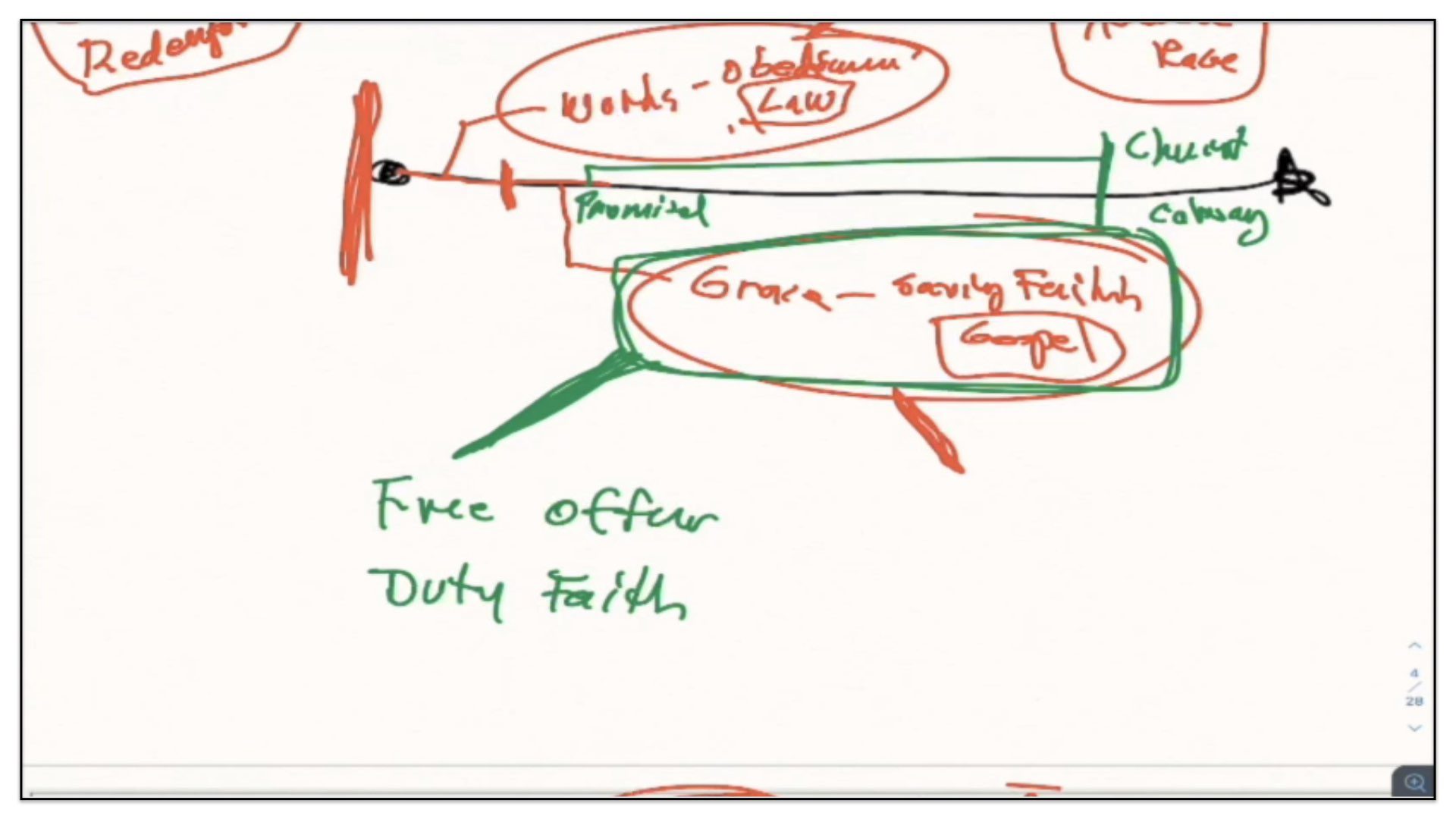
I hope you followed these teachings. I’m emphasizing this to you because I do not believe there is a conditional Covenant of Grace, as I’ve explained. And I believe it’s based on the premise of this imaginary conditional Covenant of Grace that a couple of pernicious teachings have arisen and are now the prominent view among Calvinistic churches. The first of these pernicious teachings is called the free offer of the gospel and the second of these false teachings is called duty faith.
The Free Offer Of The Gospel
Now the free offer of the gospel and duty faith is built on the premise of a conditional Covenant of Grace. And to show this to you, I would like to read for you the confessional statements of the Presbyterians and of the Reform Baptists in their own words. You’ll see exactly what they teach concerning this matter.
The 1646 Westminster Confession Of Faith
Beginning with the confessional statement of the Presbyterians, they subscribe to the 1646 Westminster Confession of Faith. I’ll read for you Article 7, paragraphs 2 and 3. Allow me just to prepare the color of the pens and the highlighter. Watch:
“The first covenant made with man was a covenant of works,” but we just covered those points. You can imagine now where that fits along the timeline and the diagram;“wherein life was promised to Adam; and in him to his posterity, upon condition of perfect and personal obedience.” Okay, so far so good. I agree. “Man, by his fall, having made himself incapable of life by that covenant,” okay, agreed; “the Lord was pleased to make a second, commonly called the covenant of grace;” Ah, now we enter into this conditional Covenant of Grace. What this confessional statement is now discussing is not the Covenant of Redemption between the Father, Son and Spirit, but rather, an agreement that God makes with sinners requiring of them faith in Christ. Watch what follows—“wherein He freely offers unto sinners life and salvation by Jesus Christ,” this of course is called the free offer of the gospel; “requiring of them faith in Him, that they may be saved,” and this of course is what is called the doctrine of duty faith, requiring of them, imposing upon them, faith in Christ that they might be saved; “and promising to give unto all those that are ordained unto eternal life His Holy Spirit, to make them willing, and able to believe.”
Now, what I like to do is highlight for you a couple of reasons why I disagree with this, with these false teachings of the free offer—I shouldn’t say, why I disagree with these false teachings; I should, let me rephrase it, why I disagree with these teachings, which then would mean I believe they’re false—why I believe these teachings are not in accordance with scripture or with this general concept of covenant theology.
An Explanation On What The Free Offer Of The Gospel Means
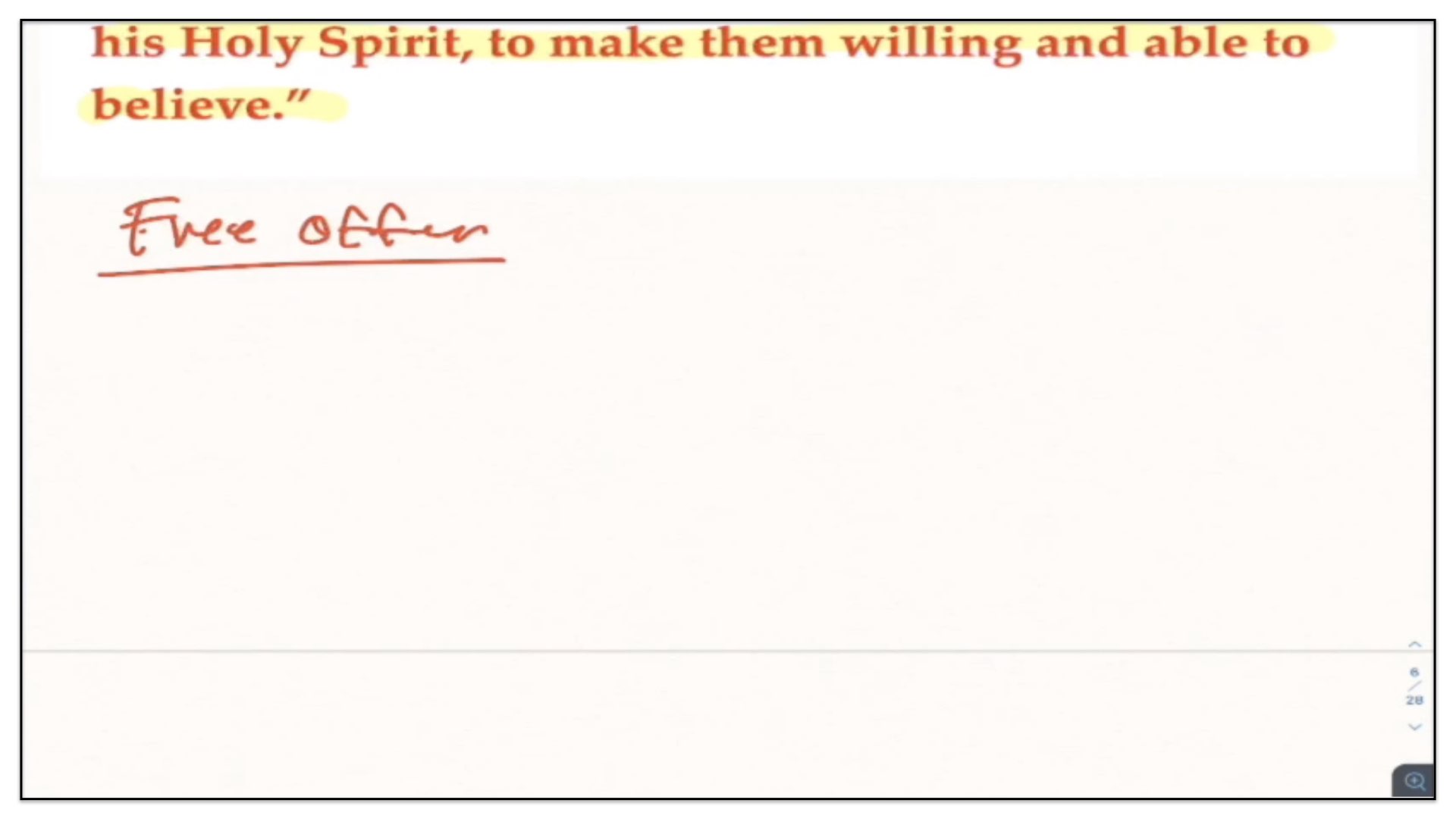
I’d like to begin first, with the the doctrine or teaching of the free offer of the gospel. Now, what exactly is the free offer of the gospel? To make it clear, we’re not talking about preaching the gospel freely to all sinners. I’m going to say that again, we’re not talking about preaching the gospel freely to all sinners. On that point, I would wholeheartedly agree. It is the responsibility of every gospel preacher to freely preach the gospel and to preach it freely to all sinners, and who come under the sound of his voice. None of us are to pick and choose who hears the gospel and who doesn’t. If God in His providence brings a sinner under the sound of our voice, then we are responsible to preach freely the gospel to that individual. So the free offer the gospel is not about freely preaching the gospel to all sinners. It has something entirely different at work here, and this is basically what it is. The free offer of the gospel goes something like this: It’s the understanding that God has a universal love for the entire human race and that He ideally desires the salvation of all sinners. That’s His ideal will—that all sinners will accept Christ. And Christ has made an atoning sacrifice that has an infinite value or virtue that’s capable of saving every man and woman on the earth, if only those persons will exercise faith in Christ. And therefore, because there is this infinite love of God for all people and an infinite virtue in the atoning blood of Christ for all people, it’s the obligation of a preacher to offer this gift, this general love of God, this general atonement, to the world. And the offer is made in a way something like this: “My dear friend, I do not know if you have been saved. Whether you have or haven’t been saved I can tell you this God loves the world. And such is His love that He’s made a provision through the Lord Jesus Christ that’s capable of saving all sinners in this world including you. And if only you will take this free gift of God that He has procured for you, and receive it unto yourself, accept the gift, then you can be saved.” It’s a sale’s pitch. The same type of sale’s pitch you’ll hear anyone make when you walk into a store to buy an item. They will present to you the virtues of why you should buy the item, they’ll convince and persuade and try to cajole you into making a decision to purchase the item. And so it is with these preachers. They will persuade and beg and cry and threaten and fear-monger in order to persuade, any way possible, to get sinners to accept this offer; this so-called gift.
Two Reasons Why I Reject The Free Offer Of The Gospel
It Puts The Unregenerate Sinner Into A Neutral Position, Assuming He/She Is Capable Of Receiving This Free Gift Of God Through The Offer Of The Gospel
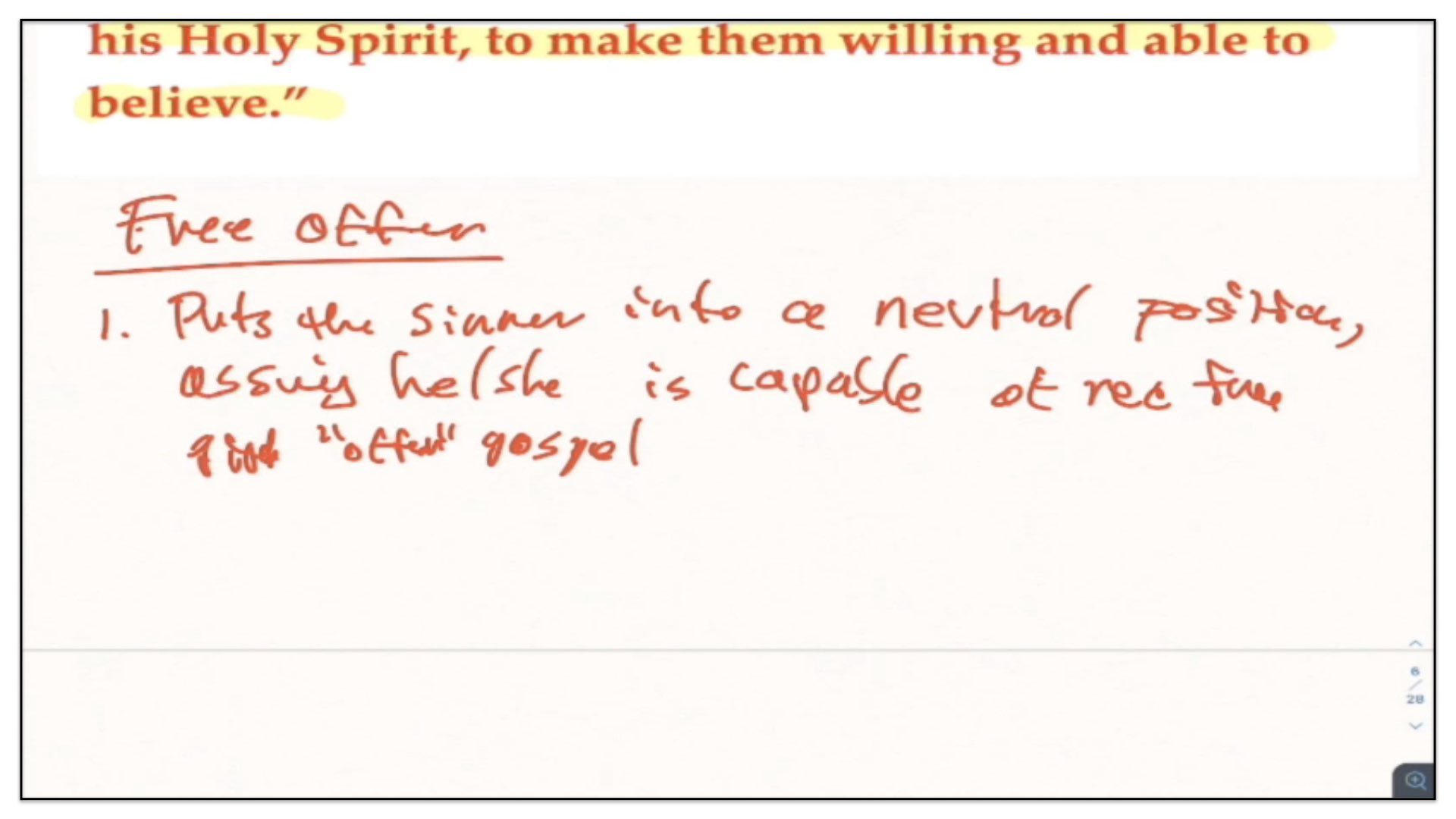
Well, is this wrong? And if so, why? The first reason I would give for it being wrong is because the free offer puts the sinner into a neutral position, assuming he or she is capable of receiving this free gift of God in Christ through the offer of the gospel. To say to an unregenerate sinner, “Here’s the gift; let me place it in your hands; it’s up to you to receive it or to reject it.” As I’ve said, it places the sinner into a neutral position as if he or she is not totally depraved; as if he or she really has a choice and will choose the good; will choose Christ if given the choice. It simply doesn’t work that way, my dear friend. That’s not how the scriptures depict the gift of God in Christ working. Listen, God does not offer this gift of salvation to sinners, but rather, God gives this gift of salvation to sinners. He doesn’t offer it. He gives it. Think of it in these terms. It’s like a rich uncle dying and after his death the lawyer calls together the various family members and friends who have been included in the will. And so you sit down among the group and you listen to the will being read and you hear your name and whatever it is your rich uncle has bequeathed to you. At the end of the reading of the will, do you think the lawyer is going to look at you personally and say, “Now look, Jane, or look, Frank, this is a free gift from your uncle. Is this something you want? I’m giving, I’m handing it out to you. All you have to do is reach out and receive it to yourself, and then it’s yours. You can seal the deal!” Or, is the gift left by the uncle in his will the possession of yours whether you want it or not? It’s the possession of yours whether you want it or not. Now, maybe you don’t want it. But it’s still yours. So you can either keep it in your bank account or you can give it away to somebody else. But it’s yours. You’re not making a decision for it. You’re not accepting it for it to be yours. It’s yours because your rich uncle placed it in the will for you. You had no participation in that becoming yours. All you’re doing is recognizing in the reading of the will that you are the owner of that which your uncle left. Now, I believe the same is true for the gospel of the Lord Jesus Christ and the free gift of God. Under the terms of the Covenant of Redemption, the Father, Son and Spirit have agreed to procure all heavenly blessings in Christ Jesus for the elect. It’s theirs. It’s theirs before the wheels of time were set in motion and before this world was made. It’s a possession that belongs to all of God’s elect people. But, when the Spirit of God regenerates the soul—and He does that without our cooperation or participation—when the Spirit of God regenerates the soul, our eyes are open to the glory of God in Christ. And then when we hear the gospel preached, it’s like the reading of the will. We suddenly hear the voice of the Lord reading to us all of the riches that had been bequeathed to us under the terms and promises of the Covenant of Redemption and the preacher’s not saying, “Here it is; it’s offered to you; you just have to accept it; you have to receive it and it can be yours in possession.” No, the preacher’s saying to you, “If you have ears to hear, then hear all the riches that belong to you in Christ.” It has nothing to do with you receiving it in order to get it. It has everything to do with you having it because God has given it to you and simply realizing this as a result of the Spirit of God’s sanctification in your heart. Now you see, that’s the first reason why the free offer is a wrong concept of preaching or presenting the gospel.
It Presupposes The Unregenerate Sinner Is Under The Authority Of Two Covenants At The Same Time, And Therefore Has The Warrant To Savingly Believe On Christ
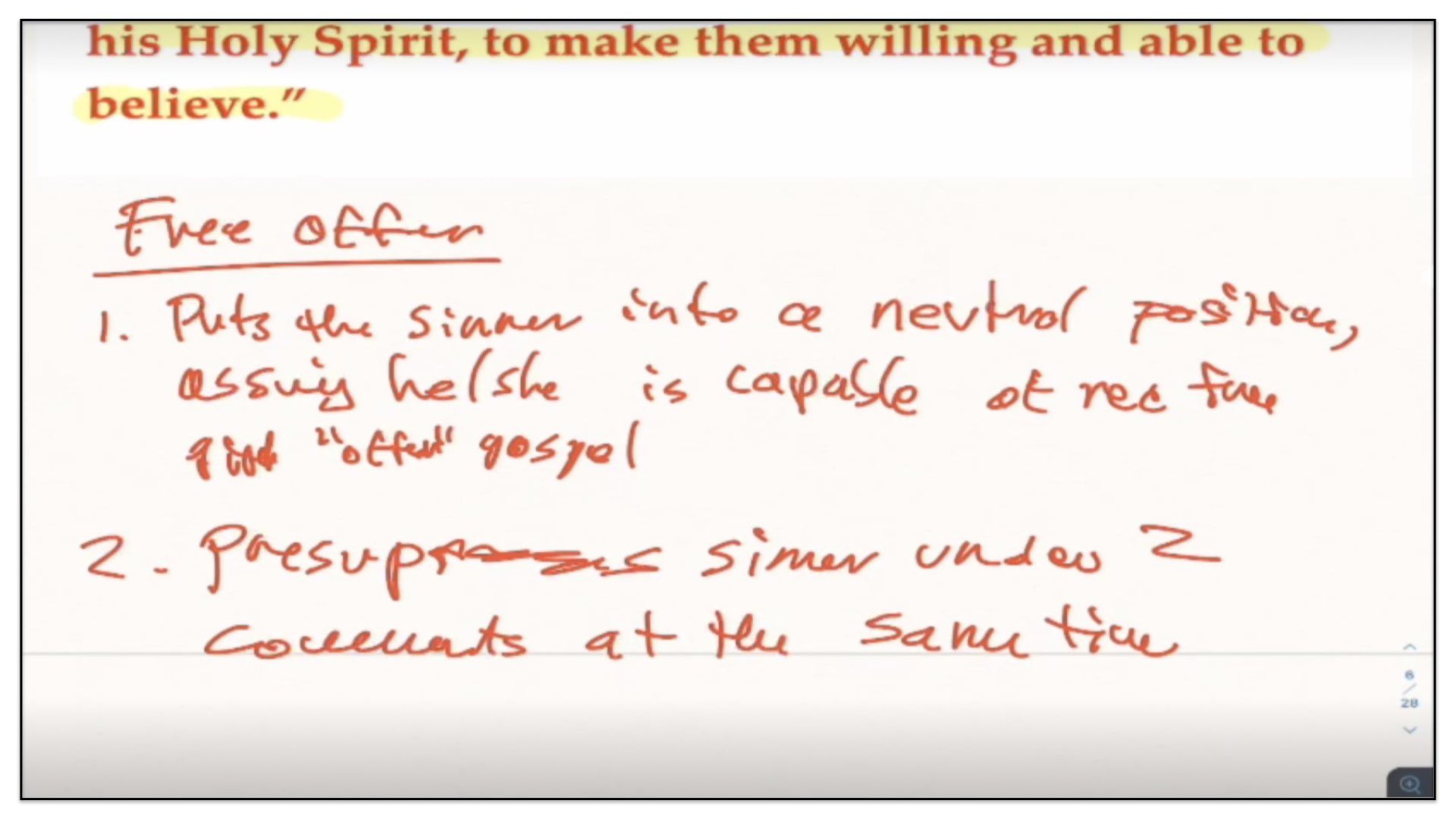
Here’s one other reason the free offer is wrong. The free offer presupposes, and this is important, it presupposes that the sinner is under two covenants at the same time, and therefore the sinner has a warrant or is given the authority to believe savingly on Christ. That is the unregenerate sinner. To show you what I mean by this, let me refer you back up to these notes. Hmm. Let me get a fresh chart here. Okay, watch.
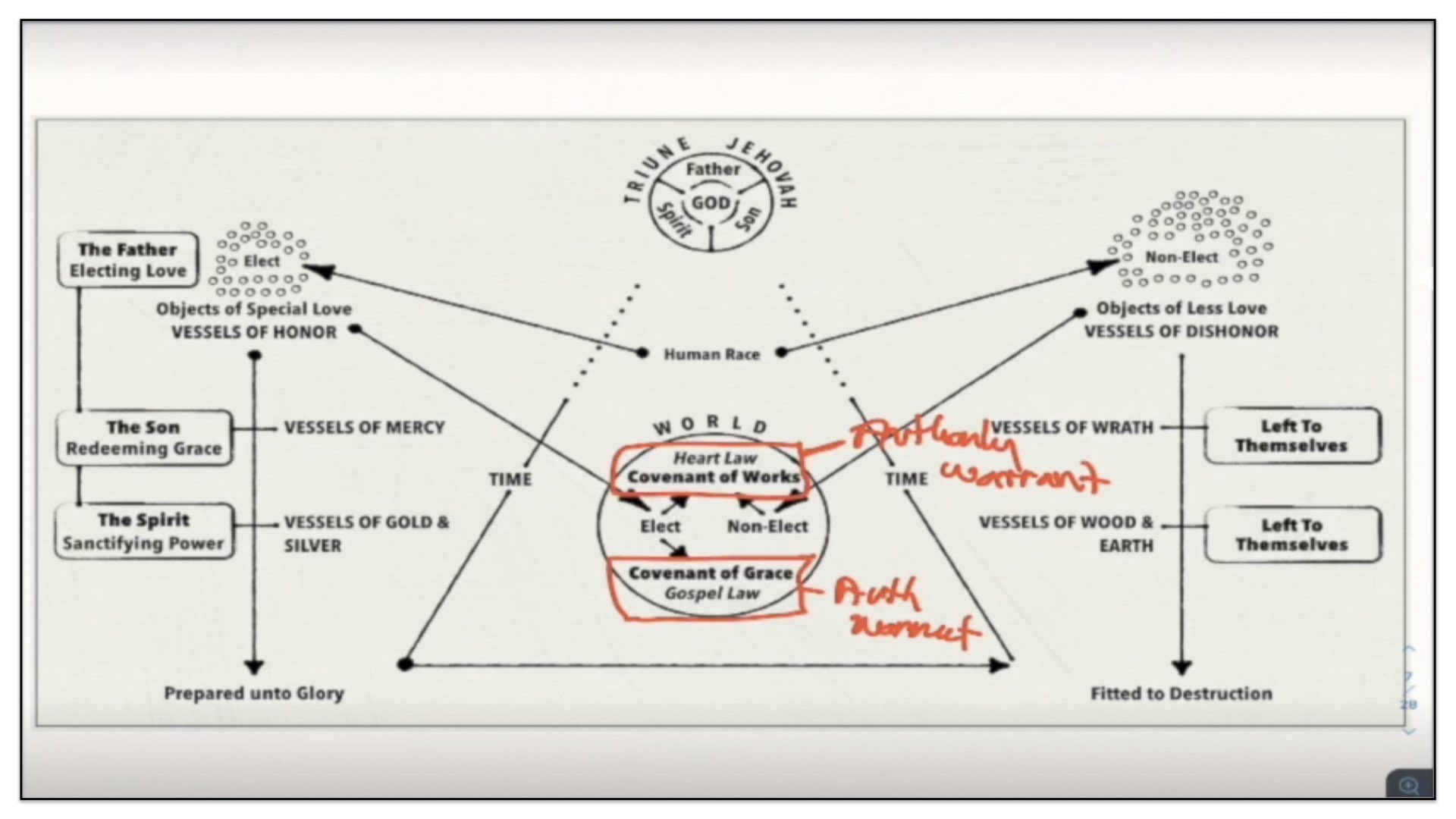
The free offer of the gospel presupposes that the unregenerate sinner is under the authority of both of these covenants, and therefore the unregenerate sinner has the authority, or the warrant (that’s what the word warrant means) the authority to perfectly obey the law inscribed upon the heart. And also, at the same time, has the authority or the warrant to savingly believe on Christ. Do you see what I mean here? The unregenerate sinner is held accountable by God under two covenants simultaneously. And I’m suggesting, I’m arguing to you, that that is not how covenants work.
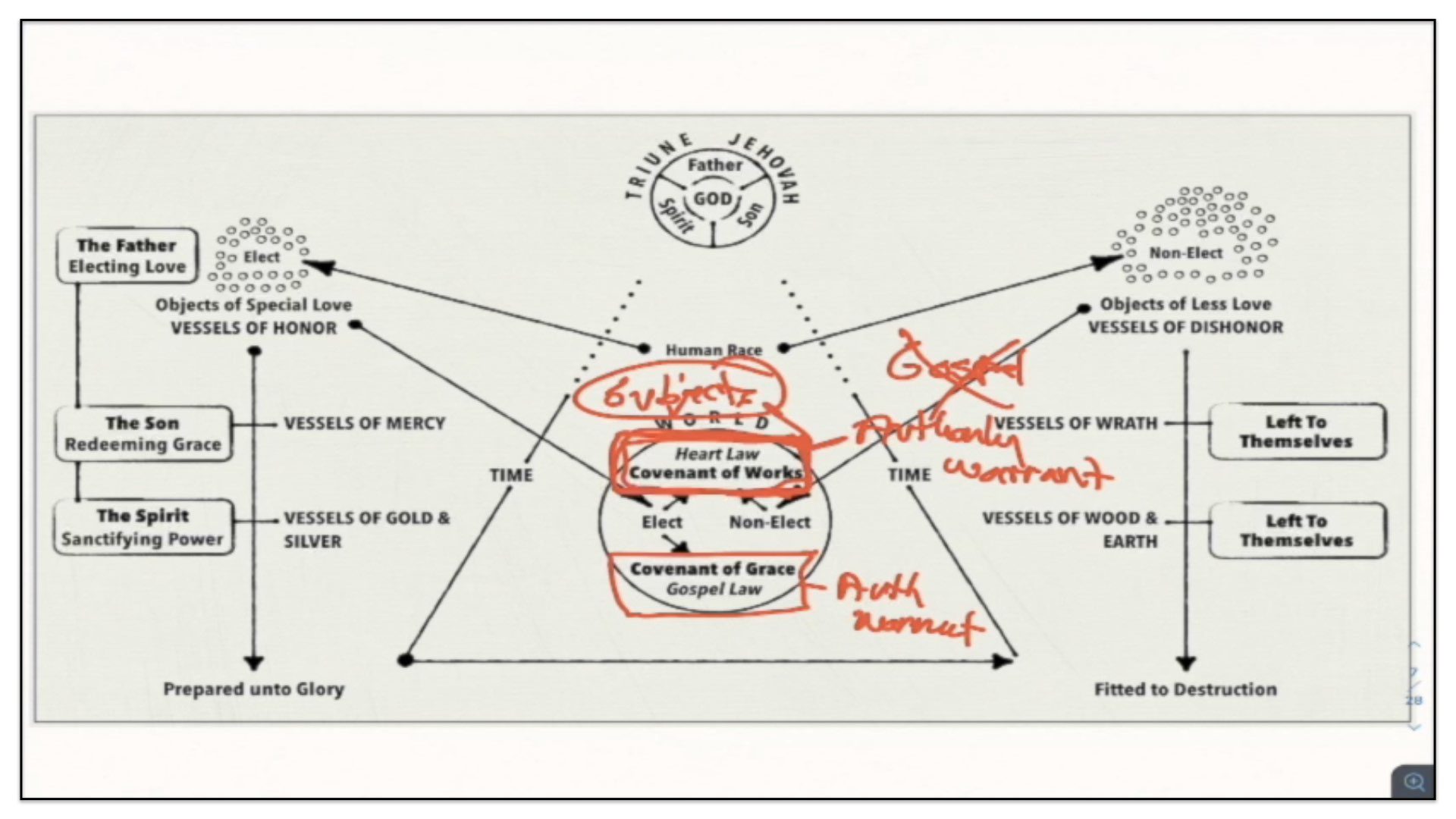
So long as the unregenerate sinner is under the authority of the Covenant of Works, he or she is subject to the terms and promises of this covenant. And under the Covenant of Works, there is no gospel message. None.
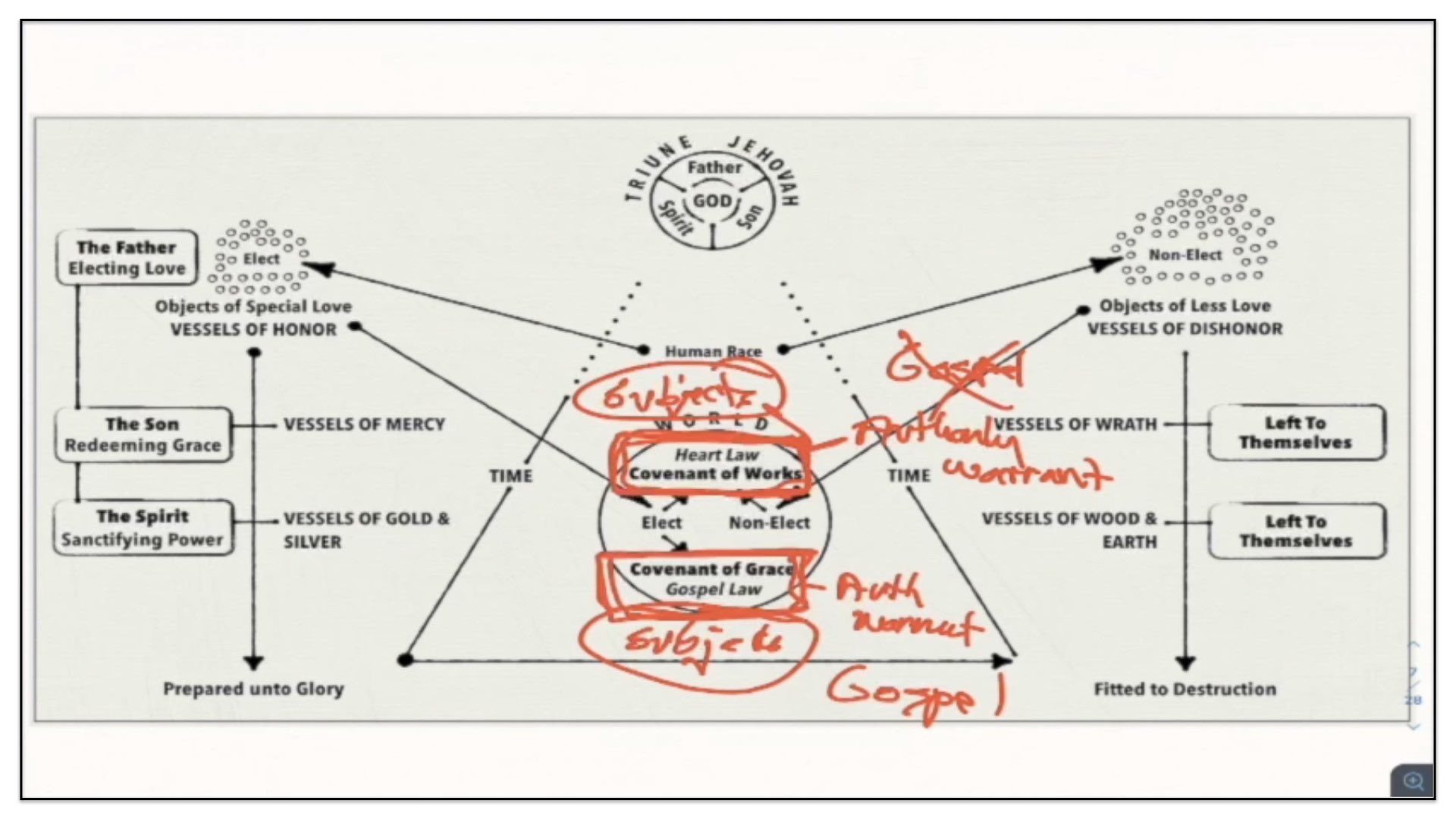
But when the Spirit of God regenerates the sinner, then the regenerate sinner is delivered from the Covenant of Works and is brought experientially under the Covenant of Grace and is made subject to that covenant—a covenant which is based upon the gospel. And the gospel is all about savingly believing on the Lord Jesus Christ.
Now you see, the free offer of the gospel would say to the sinner, give to the sinner, a mixed message. It tells the sinner that his or her responsibility is to believe on the gospel and if he or she doesn’t, then that’s going to add to their condemnation and send that person to a deeper pit in hell. Now if that’s true, the gospel is no longer good news, is it? Bad news! At least it’s bad news for those who reject it because they’re going to burn in a deeper pit in hell when they die. But I don’t find any place in scripture which tells us the gospel is ever bad news to anybody. The gospel is only ever good news. And it’s good news, not to the world at large, but rather, it’s good news only to those who have been born again. For only they have ears to hear the goodness of the Lord in Christ Jesus unto salvation. All of those who are unregenerate, they’re blinded and deaf and dead in trespasses and sins. They don’t hear anything good in the gospel. They don’t care about the gospel. And you see, that’s how I view this issue of the two covenants and the subject of the free offer.
The Doctrine Of Duty Faith
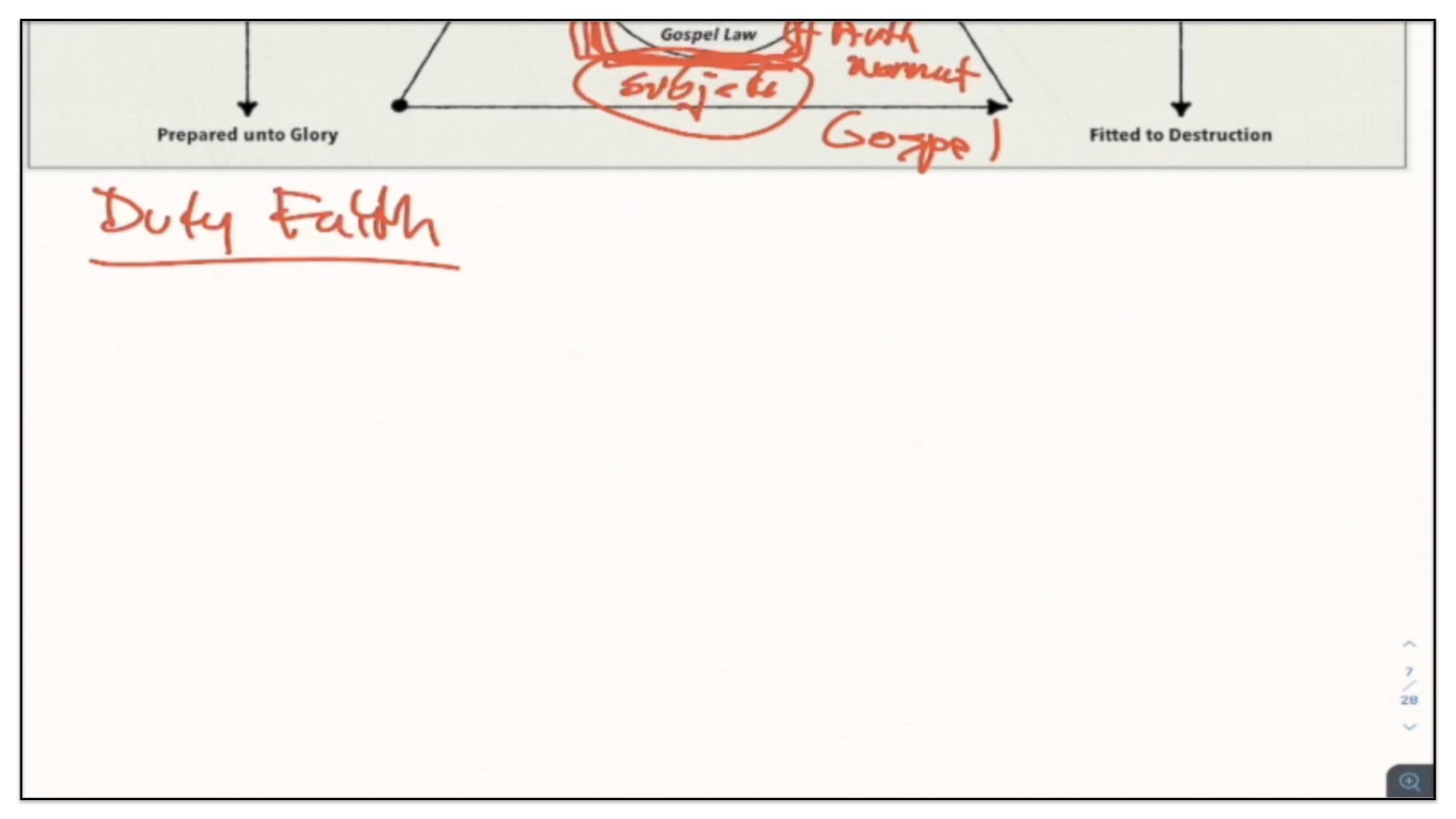
Well, this brings us to say something about the doctrine of duty faith, and let me just highlight for you a couple of points. So I believe duty faith is not a true teaching.
Two Reasons Why I Reject The Doctrine Of Duty Faith
So Long As The Unregenerate Sinner Remains In That Condition, He/She Is Bound To The Authority And Responsibility Of The Covenant Of Works
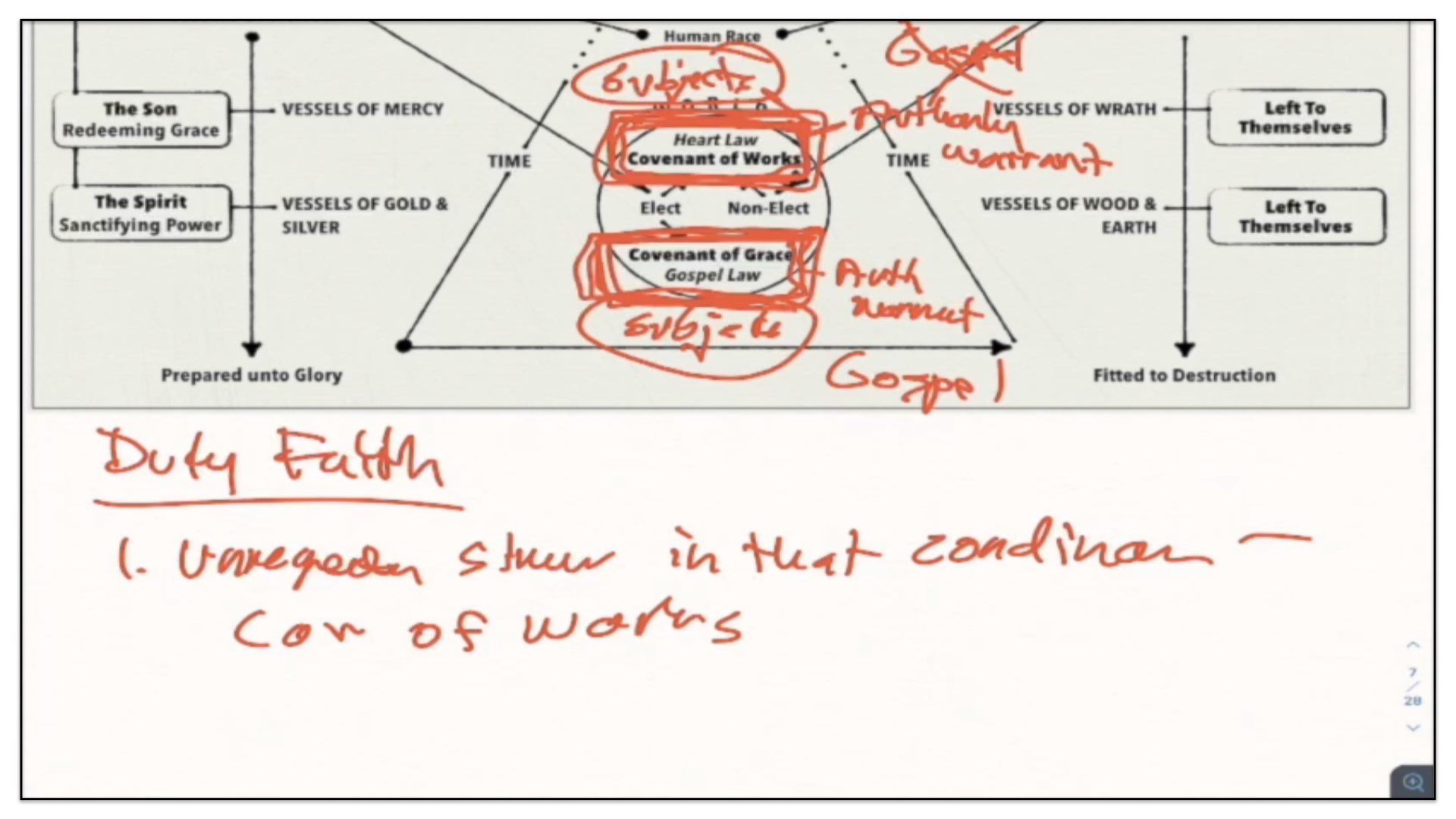
First, so long—and I just highlighted this for you, so I don’t have to labor it—so long as an unregenerate sinner remains in that condition, he or she is bound to the Covenant of Works.
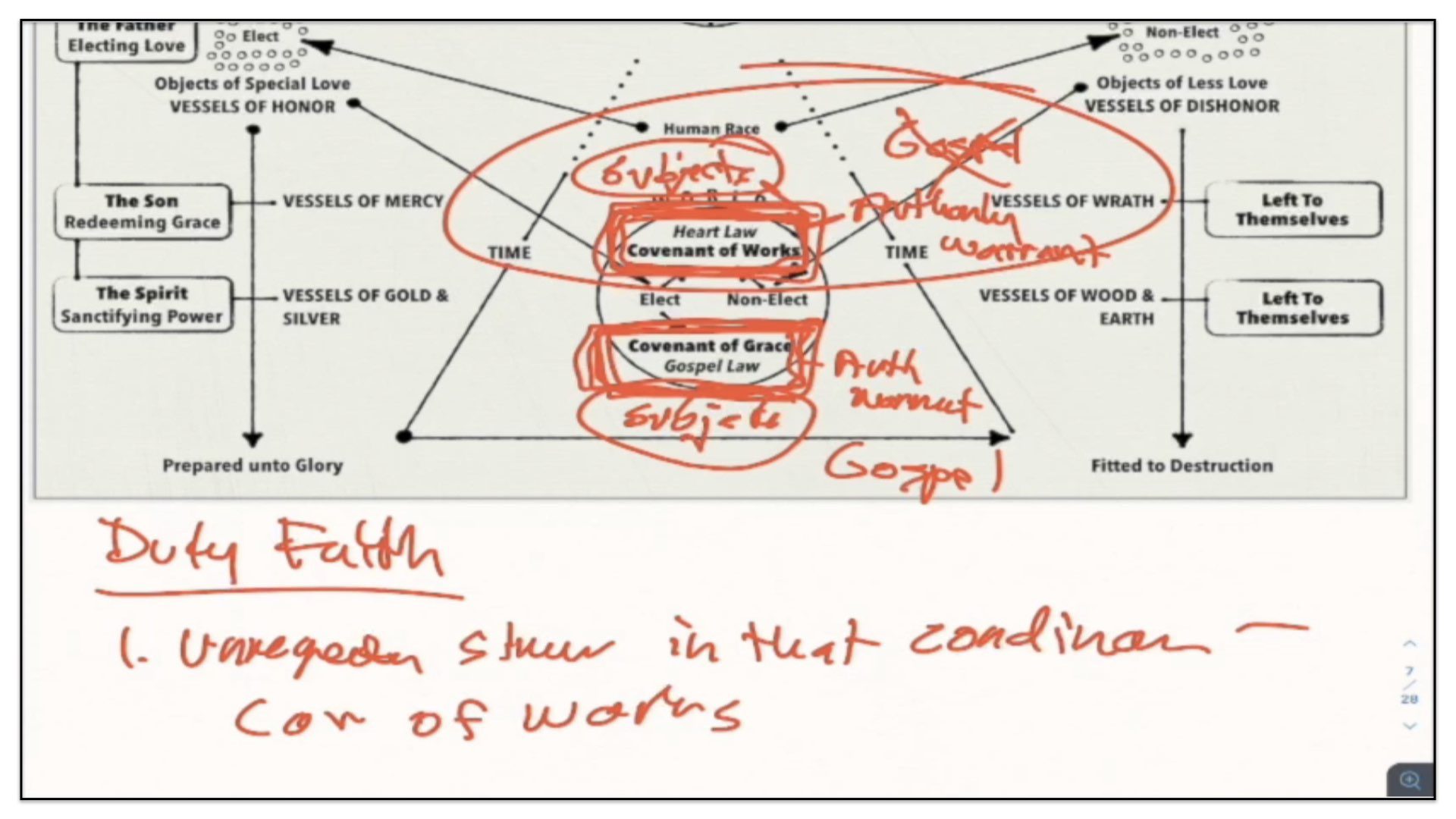
There is no gospel in the Covenant of Works. An unregenerate sinner should be told he or she is accountable unto God under that Covenant of Works; he or she is required to perfectly obey the law inscribed upon the heart; to love God supremely, to love your neighbor as yourself. And a failure to do so is sin. It’s a transgression of the law and it’s that sin which brings that individual under the wrath of God and the condemnation of God. And so long as that sinner remains in a condition of sin, he or she is dead spiritually; cannot reach God; cannot do good for God; cannot earn favor with God. All of the person’s repentance and good works is not sufficient to save him or her from their sins. And this is their hopelessness and helplessness in that condition. They can do nothing of themselves and they are forever doomed so long as they remain in that condition, under the Covenant of Works. And in preaching that message, if God is pleased to regenerate His elect people, then suddenly those persons’ eyes will be opened and they will say, “Woe is me, for I am undone; I am a man or woman of unclean lips; I am a sinner in and through; I am separated from my Maker; I deserve His wrath and His punishments; but oh, is there not grace with God to deliver me from this wrath and condemnation?”
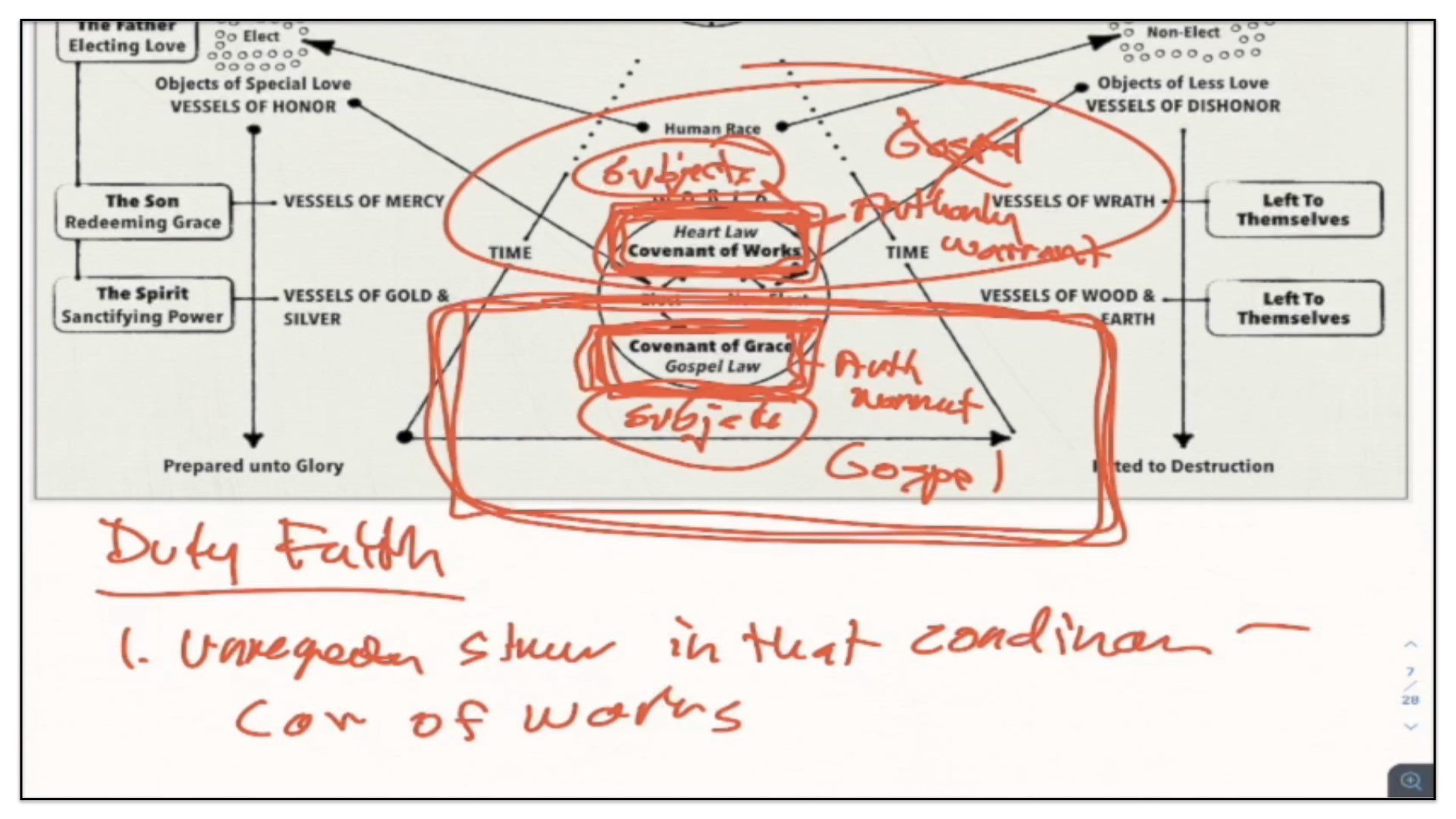
Then my dear friends, it’s our great joy as the heralds of the gospel, of the good news of glad tidings, to open the way for sinners to see there is hope and help with God in Christ by the power of His Spirit. It is the Covenant of Redemption, or the Covenant of Grace. And as the Spirit of God gives to us ears to hear and eyes to see and a heart to feel, then we have a warrant to reach out and take of Christ and freely drink of the Fountain of Life, and to find rest unto our souls. That’s the message of the gospel. And that’s why duty faith is wrong. We don’t press upon the unregenerate the duty to savingly believe, but their duty to perfectly obey the law. We do however, encourage and invite those sinners who have been awakened by the Spirit of God to freely come unto Christ and to partake of that salvation.
The New Birth Gives To The Sinner The Ability (Spiritual Capacity) And Authority (Covenantal Warrant) To Savingly Believe On Christ
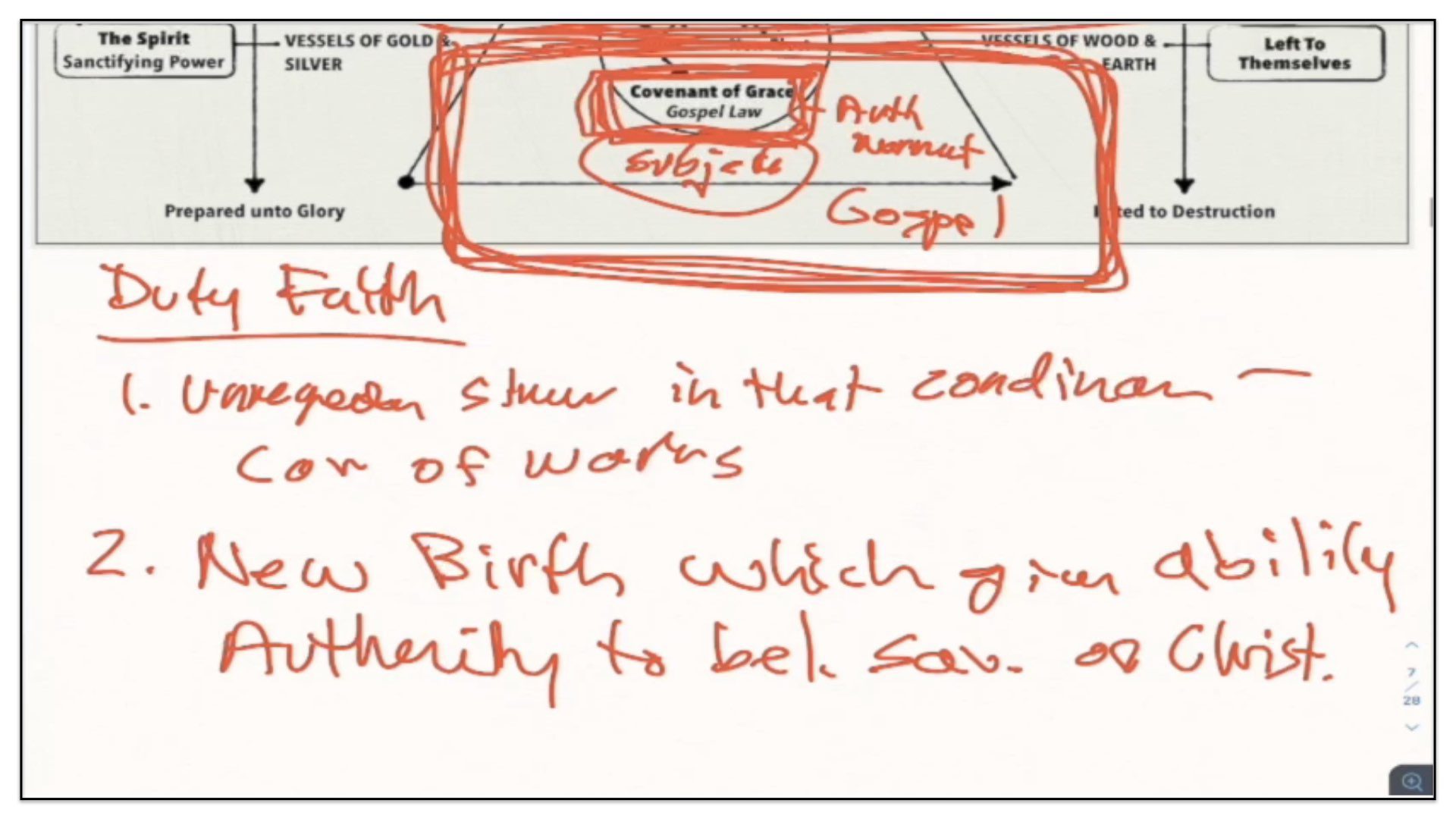
Alright. So then, let me mention one more reason why I believe the doctrine of duty faith is false. It’s the new birth which gives, not only the ability, but the authority to believe savingly on Christ. And this is such an important point, my dear friend.
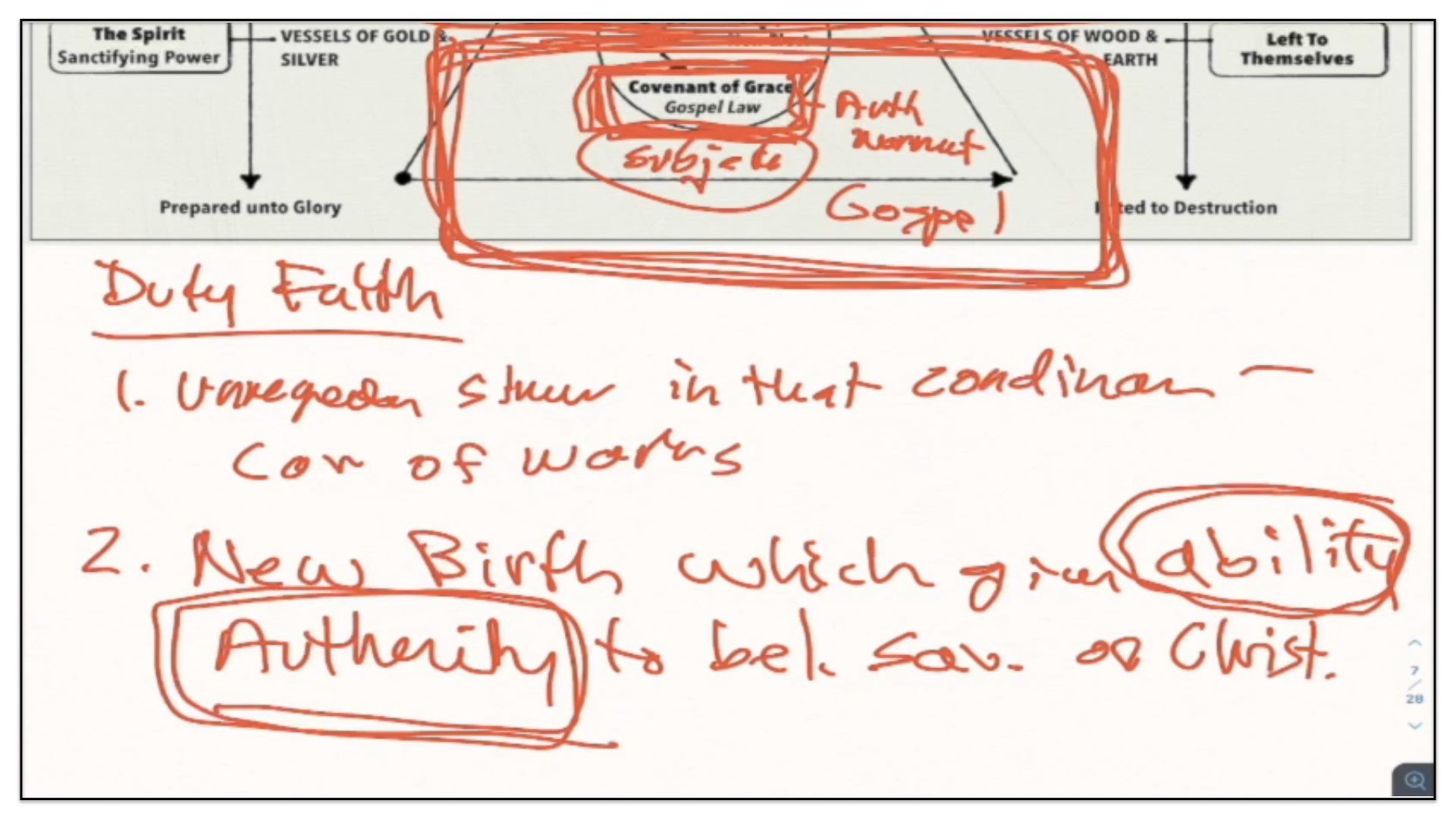
Many times, all the time, the Reformed Baptists and Presbyterians focus on ability. They say, “Well, of course the new birth is required in order to give the ability to the unregenerate sinner saving faith in Christ.” They believe saving faith comes after the new birth. However, they get caught up on this issue of authority, and so the Reformed Baptists and some Presbyterians will argue—this is their misunderstanding—they will say, “Even though an unregenerate sinner is unable to believe on Christ until he or she is born again, it doesn’t negate his or her responsibility to believe on Christ.” Do you see the point? They’re saying even though the unregenerate sinner doesn’t have the ability to believe until the new birth, yet it remains his or her duty (authority) to believe even if never born again, and they are confusing this whole issue of authority of covenants.
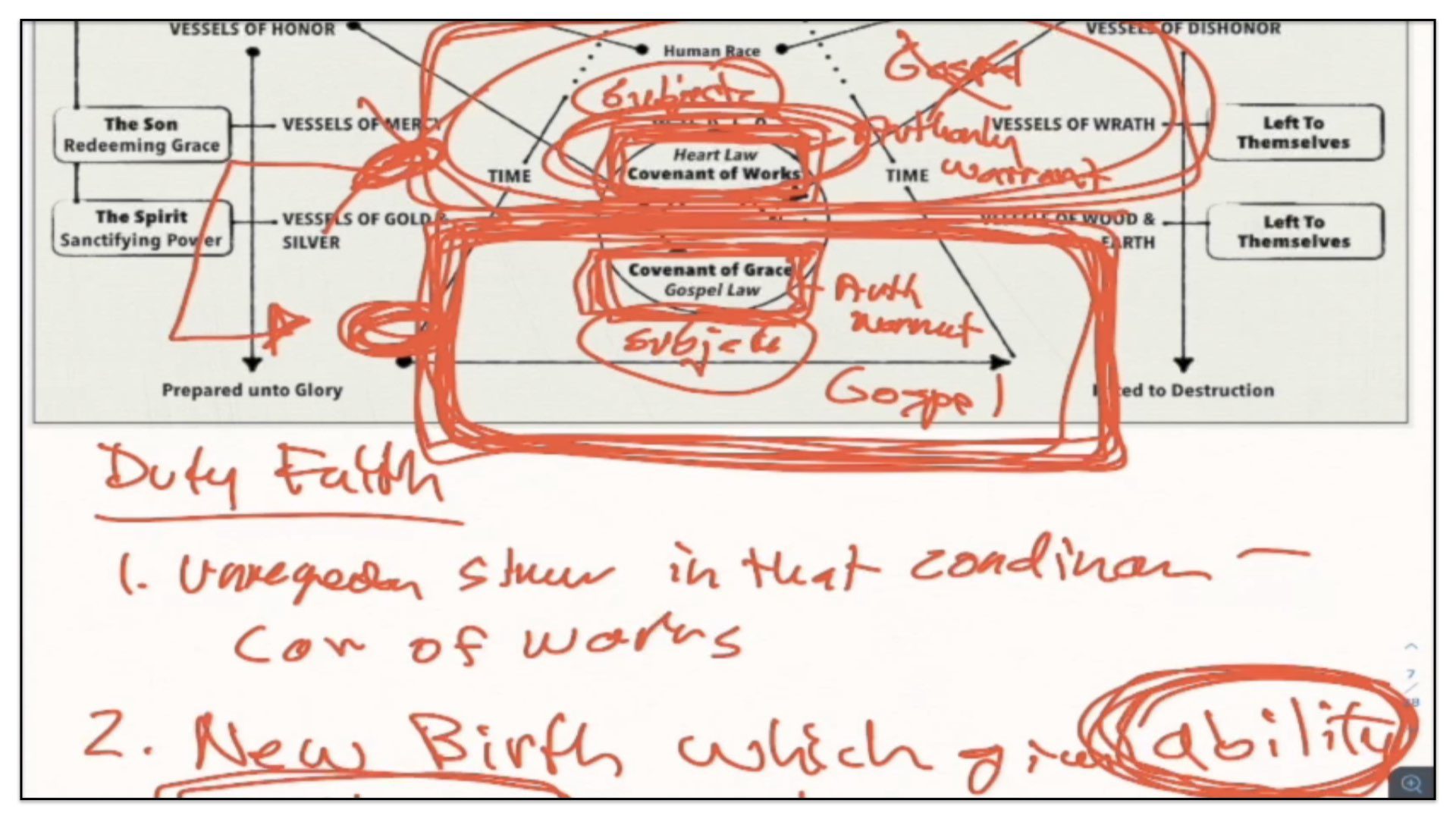
It is only after the Spirit of God regenerates the soul, giving us the ability to believe (the spiritual ability) that the Spirit of God also delivers from the Covenant of Works to the Covenant of Grace or Redemption, the authority to believe all that God has given to His elect people. And duty faith, therefore, cannot be a true doctrine. It is only true for those who have been born again or regenerated. And I think I’ve done sufficient to explain how the gospel should then be presented to sinners if duty faith is not an accurate teaching.
The 1689 Baptist Confession Of Faith Is Not The Benchmark For The English Particular Baptists
Alright, well listen, I spent far too long on giving these explanations. But before I close this study, I do want to say something further about the Reformed Baptists and the issues connected with the conditional Covenant of Grace out from which these false teachings of the free offer and duty faith have risen.
The 1689 Baptist Confession Of Faith
The Reformed Baptists and their 1689 Confession of Faith repeat almost word for word what we just read in the Presbyterian Confession of Faith. Watch:
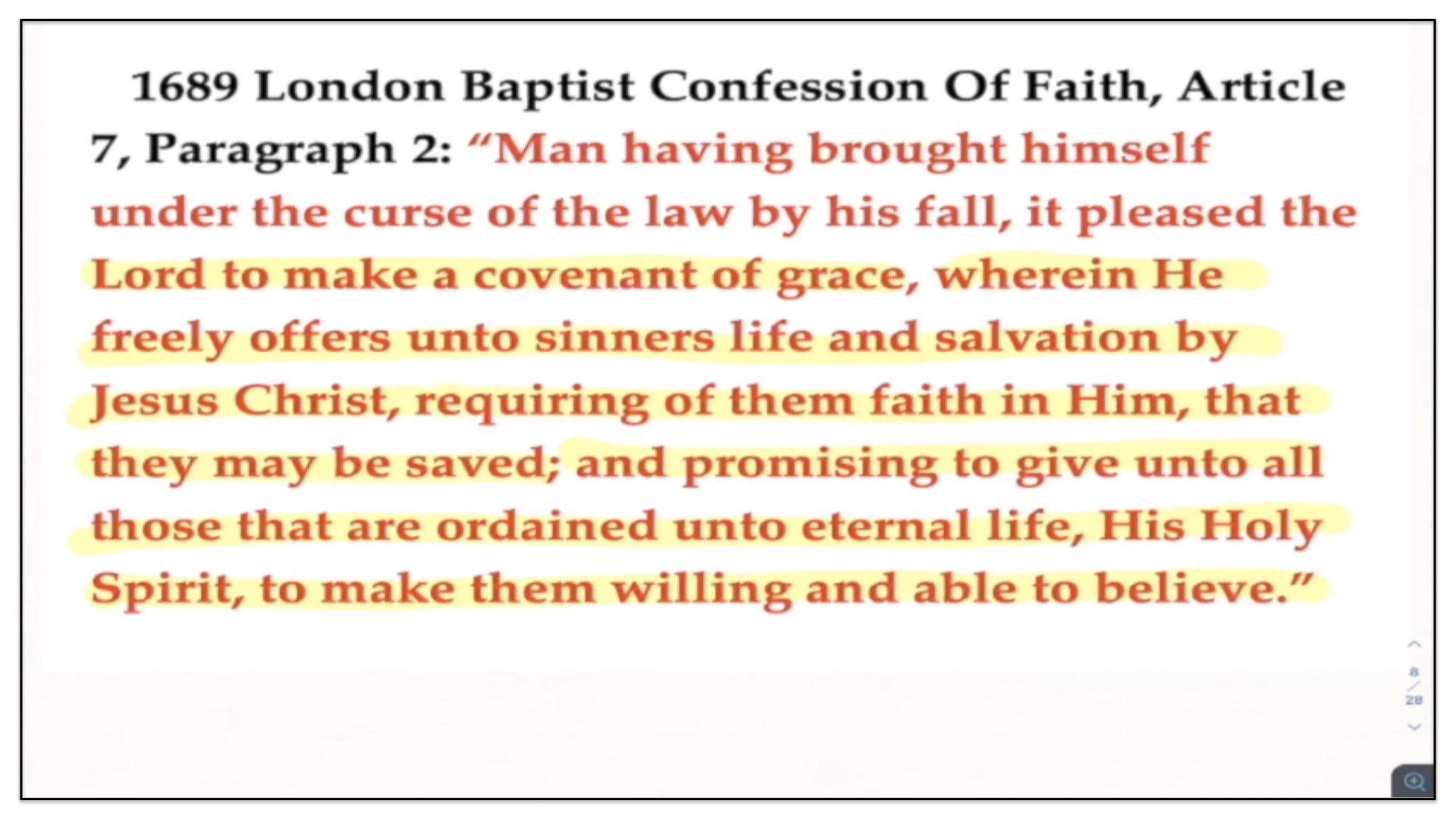
“Man having brought himself under the curse of the law by his fall, it pleased the Lord to make a covenant of grace,” There it is, that’s the conditional Covenant of Grace, “wherein He freely offers unto sinners life and salvation by Jesus Christ,” the free offer, “requiring of them faith in Him, that they may be saved,” duty faith, “and promising to give unto all those that are ordained unto eternal life, His Holy Spirit, to make them willing and able to believe.” And you see, at the closing statements of these confessions, they do make reference to the requirement to the Holy Spirit giving the ability to sinners to believe, but as I’ve said, they’ve mixed up these issues when it comes to the authority under which covenant a sinner is subject.
Benjamin Keach Rejected A Conditional Covenant Of Grace, Dismantling The Covenantal Framework Of The Confession
Okay, well look, I want to say about the Reformed Baptists, that the Reformed Baptists, when the statement was written, is not something the signers of the statement actually embraced as their benchmark for faith and practice. And as an example of this, take Benjamin Keach, who was one of the leading Particular Baptists in the 17th century and a signer of the 1689 London Baptist Confession. Nine years after signing that confession his congregation requested that Keach give to them a confessional statement. Now, you might assume that because the 1689 Confession, with it being such, a having such great expressions of truth, as the Reformed Baptists would tell us, you would think that Keach would then simply adopt the perfections of the 1689 as that which he would then give to his own congregation in 1697. But it wasn’t. Keach actually drew up his own confessional statement and gave that to his congregation. So Keach didn’t personally subscribe to the 1689 with it being the benchmark and the end of his faith in practice. And neither did he recommend that to his church? In fact, two or three years after he signed his name to the 1689 confession, Keach preached two sermons which the year later were published in a pamphlet, which denounced the seventh article—this seventh article of the 1689 Confession—he denounced it and uprooted this entire framework of covenant theology. This idea of a conditional Covenant of Grace. I want to read for you—I know these statements I’ve read in a previous study, but I do it again to press home to you the importance of this explanation. Watch. Here’s the words of Benjamin Keach in those sermons he preached:
“Question:—Is not that covenant which was made between the Father and the Son called the Covenant of Redemption made from all eternity a distinct covenant from the Covenant of Grace?” That’s the whole question we’ve been examining in this study. Keach answers, “I must confess, I have formally been inclined to believe the covenant or holy compact between the Father and the Son was distinct from the Covenant of Grace,” Keach says, the Covenant of Redemption and the Covenant of Grace are two separate covenants, “but upon further search, by means of some great errors sprung up among us,” great errors; I highlighted the free offer and duty faith to be too great errors; I don’t believe Keach was referring to those specific errors to the degree that I’ve discussed them, but I do believe there’s sufficient information in Keach’s writings in the latter part of his ministry that he was beginning to see the errors of the free offer and duty faith; now watch, “by means as some great errors sprung up among us, arising as I can see, from that notion (of a conditional Covenant of Grace), I cannot see that they are too distinct covenants, but both one and the same glorious Covenant of Grace. Where do we read and all the Holy Scripture of three covenants—a Covenant of Works, a Covenant of Redemption, a Covenant of Grace?” See, that’s what the Presbyterians and Reformed Baptists believe—three covenants. “Evident it is too all that the Holy Spirit only holds forth or speaks, but of two covenants—a Covenant of Works and a Covenant of Grace,” or a Covenant of Redemption.
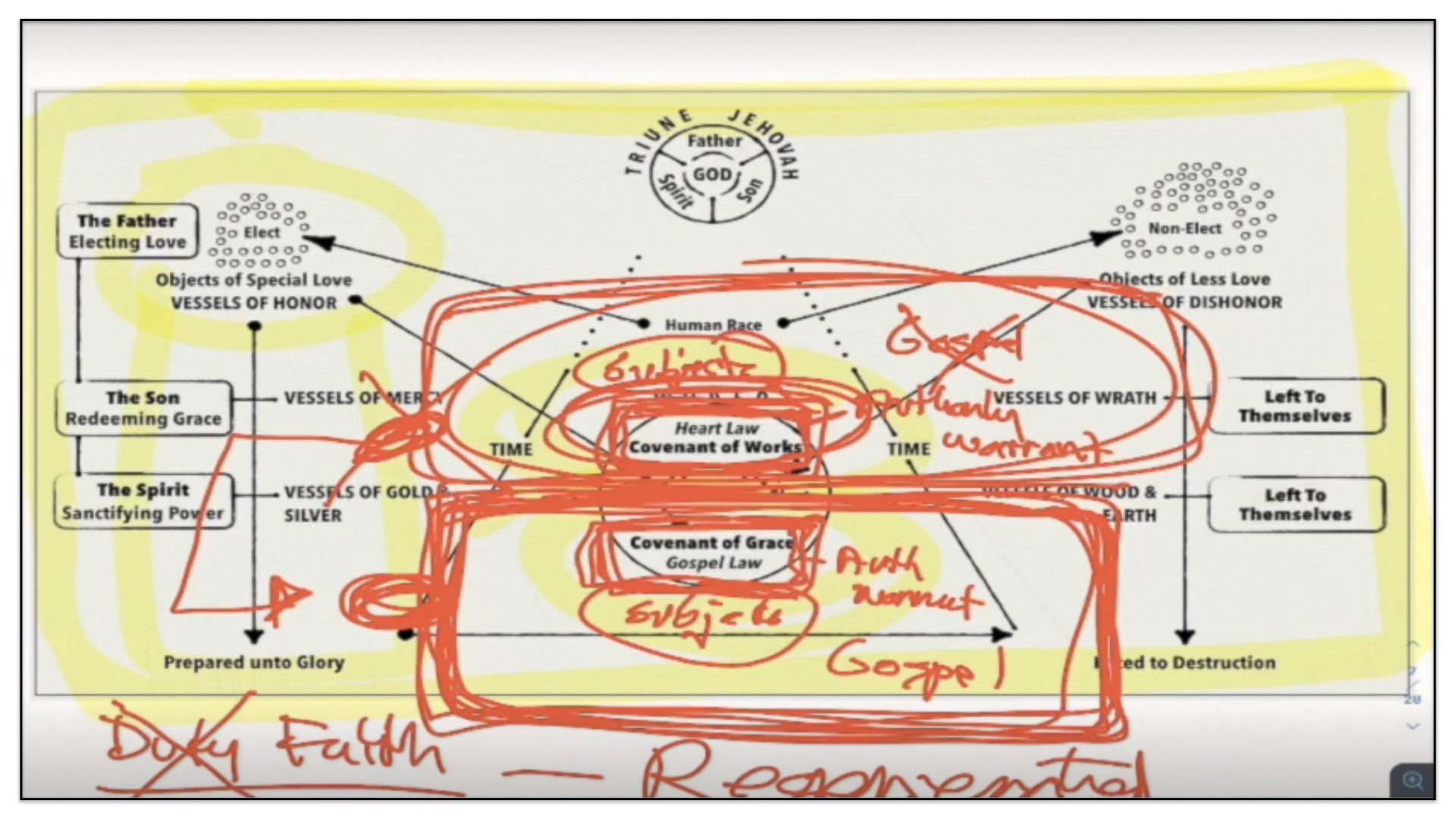
Now you see, in essence Keach is presenting to you the same teachings I have given in this Framework of Sovereign Grace. Two covenants, one of Works and one of Grace or Redemption. Well, that’s Keach’s statement.
John Gill Agreed With Keach’s Position, Developing The Teachings In His Doctrinal Body Of Divinity
Sixteen years after Keach’s death, the church appointed John Gill to serve as the new pastor. Nine years after Gill’s pastorate, Gill presented to his congregation a new confessional statement that he drew up. It’s called the 1729 Goat Yard Declaration of Faith. And then, of course, in 1769 Gill published, just a few years before his death, the Doctrinal Body of Divinity, which was the first exhaustive systematic theology written by a Baptist. John Gill took the same views of Benjamin Keach. He denounced the idea of a conditional Covenant of Grace, therefore dismantling the seventh article of the 1689 Confession of Faith. And I now read for you a statement given to us by Gill in his Doctrinal Body of Divinity:
“The Covenant of Redemption is the same with the Covenant of Grace; some theologians indeed make them distinct covenants (like the Presbyterians and the Reformed Baptists); the Covenant of Redemption, they say, was made with Christ in eternity; the Covenant of Grace with the elect or with believers in time; but this is very wrongly said; there is but one Covenant of Grace and not two; what is called a Covenant of Redemption is a Covenant of Grace; there can be no foundation for such a distinction between a Covenant of Redemption in eternity and a Covenant of Grace in time.”
The TriUne Jehovah Brings To Pass In Time The Covenant Of Redemption (Grace) From Eternity
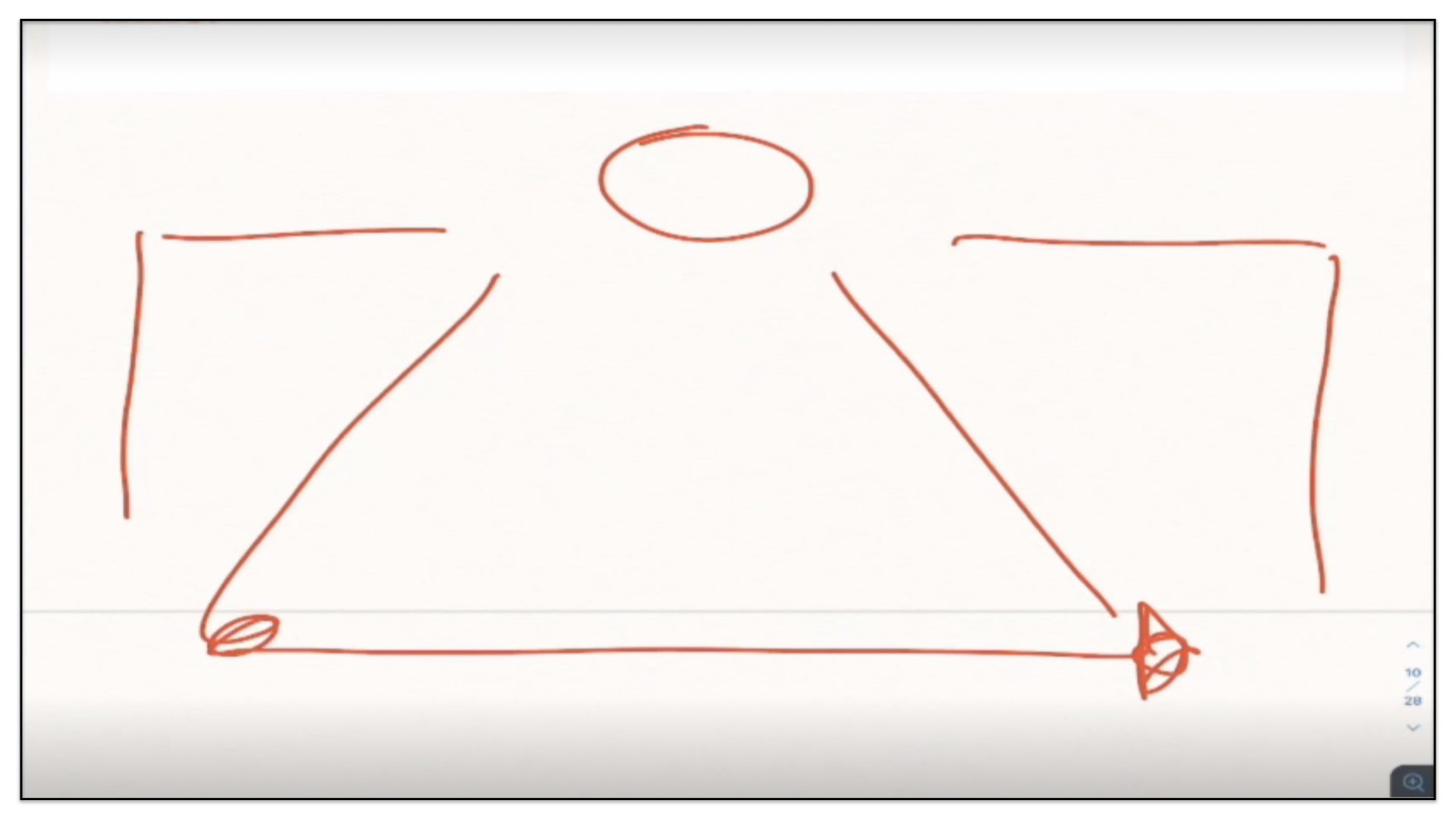
Therefore—and I close now my final thoughts on this teaching—therefore our view is this. This is the basic understanding of the Framework of Sovereign Grace. Because the messy notes above I can’t use those now. I have to just draw this out basic. So watch.
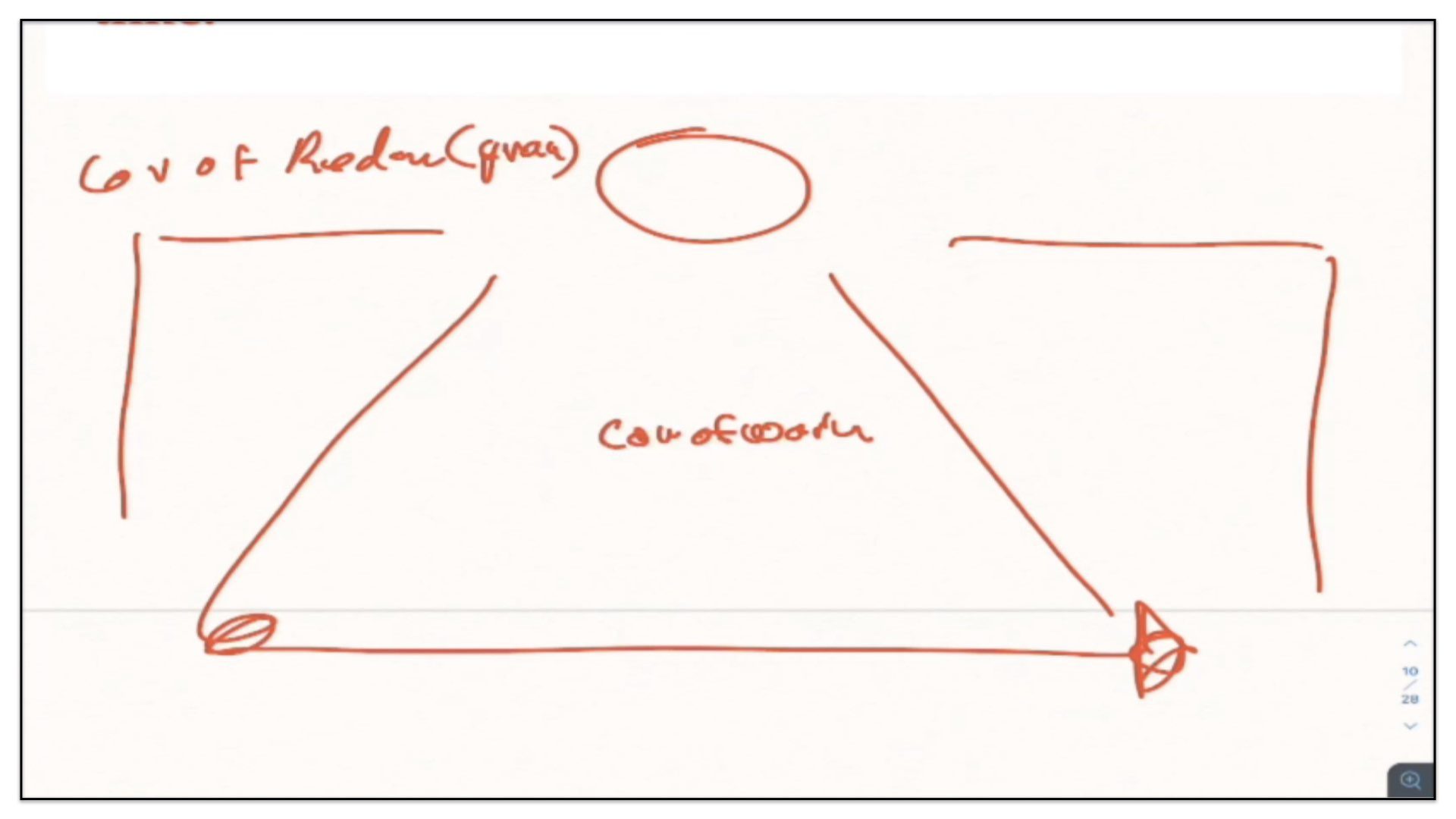
The Triune Jehovah, setting up this Covenant of Redemption or of Grace from eternity, together with a Covenant of Works in time.
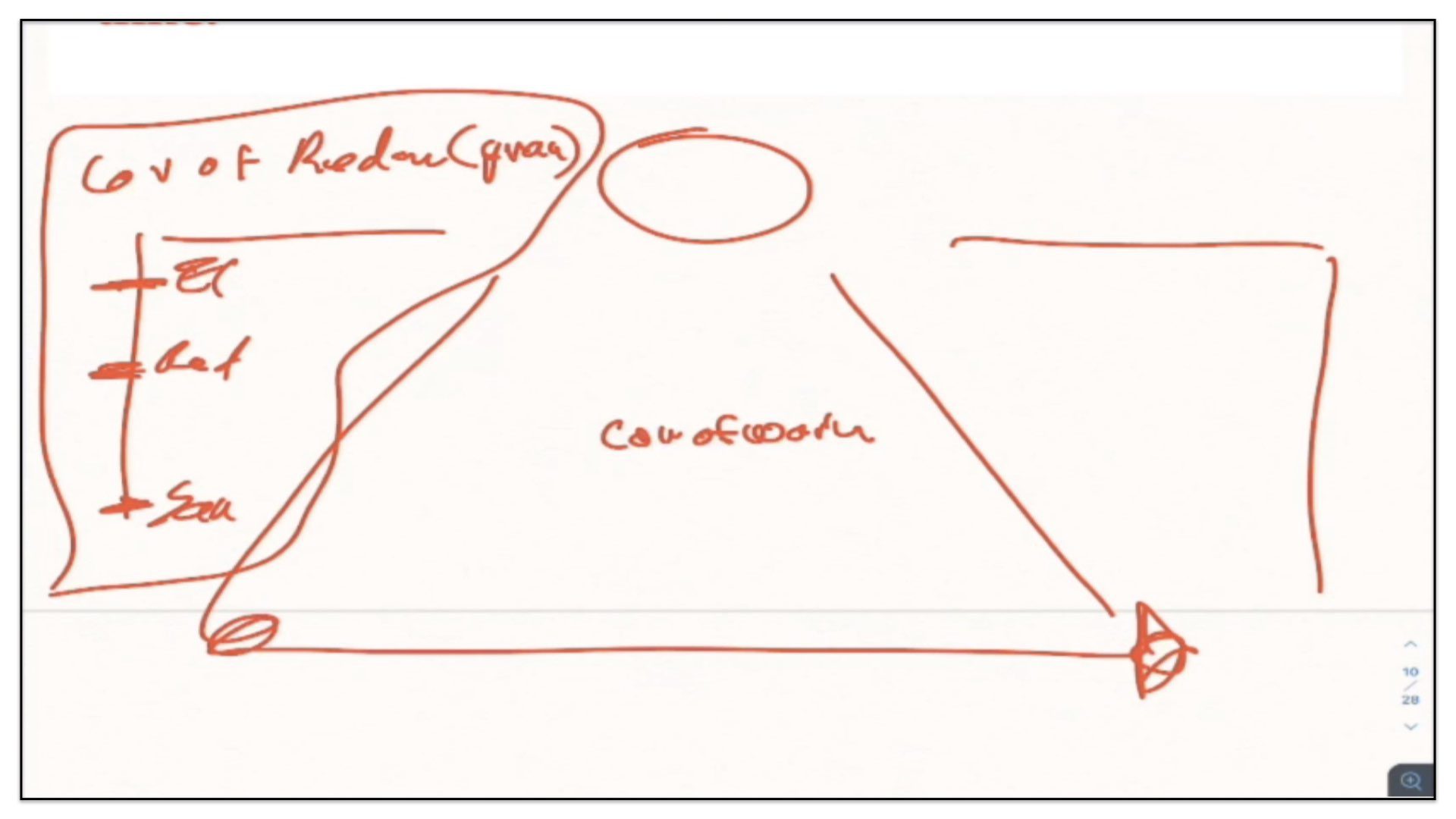
This Covenant of Grace has three parts—election, redemption and sanctification or regeneration.
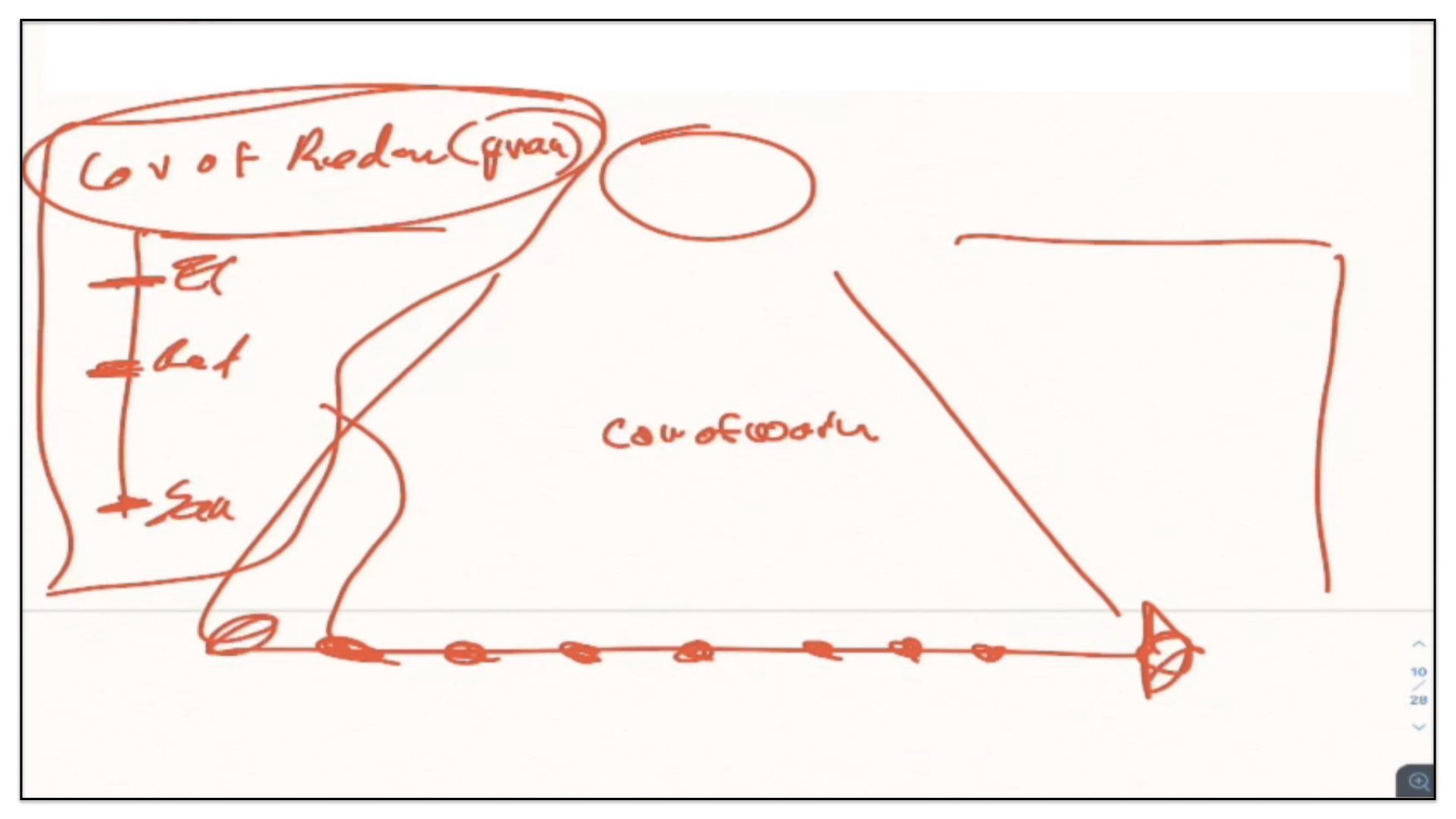
In time, God brings to pass this covenant in the lives of each of His elect people.
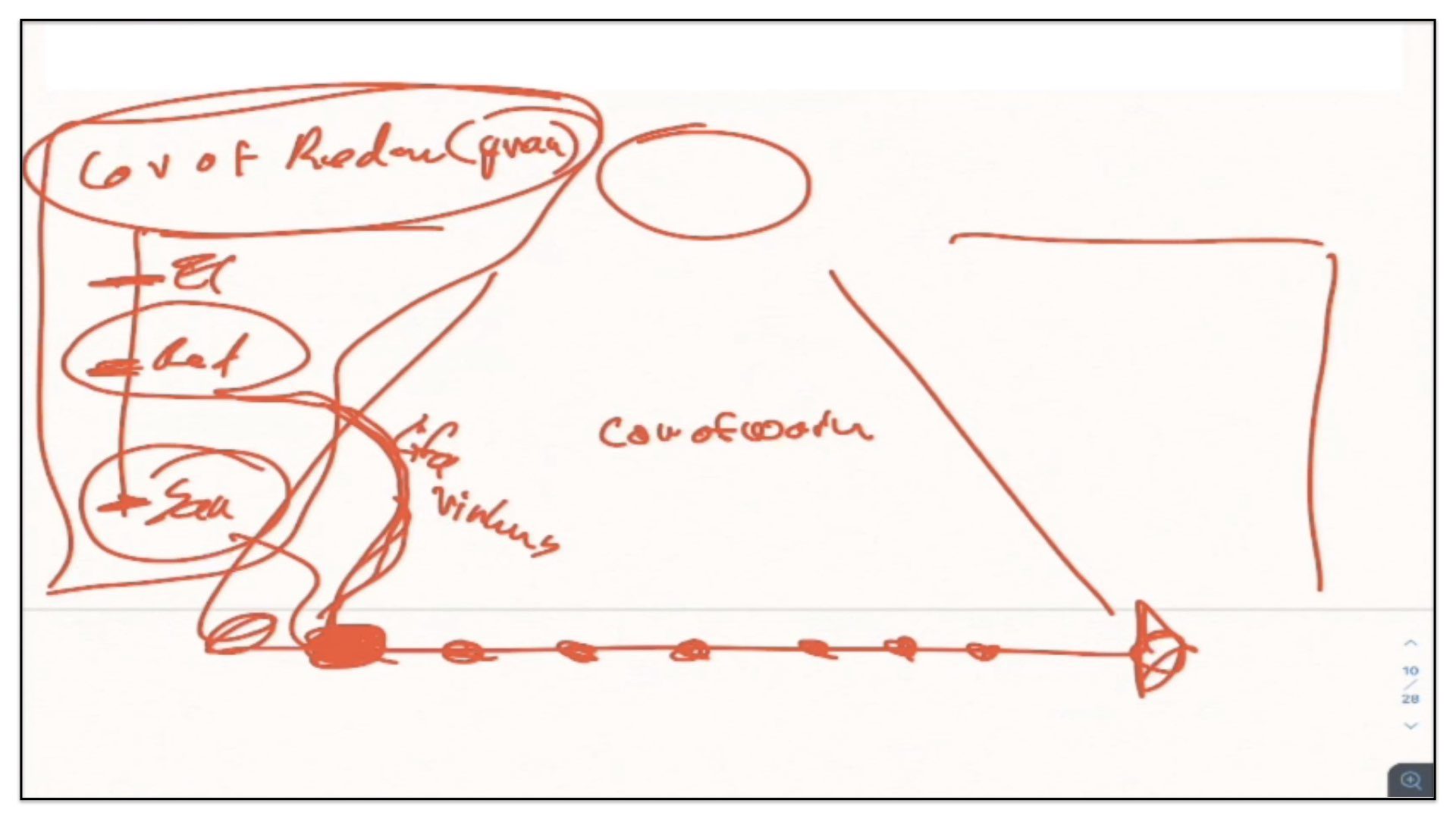
In other words, the Covenant of Redemption does penetrate time. God doesn’t establish a New Covenant of Grace in time. Rather, He brings to pass His eternal covenant, the Covenant of Redemption in time by regenerating these souls, uniting them to Christ, by virtue of which the life and virtues of Christ flow into the soul making them alive unto God. Adam and Eve experienced that; Able experience that; Seth experience that; all of the Old and New Testament saints leading up to our day and to the end of this world will experience one and the same salvation. A salvation based on the regenerating power of the Spirit of God, where He unites the soul with Christ, all of which is based on the electing love of God the Father.
The Four Earthly And Temporary Covenants, Together With The Covenant Of Works And The Covenant Of Redemption, Along With The New Covenant, Have Absolutely Nothing To Do With A Conditional Covenant Of Grace
Do the four earthly covenants have anything at all to do with a conditional Covenant of Grace? That’s the whole issue that we’re dealing with here. And I say, absolutely not.
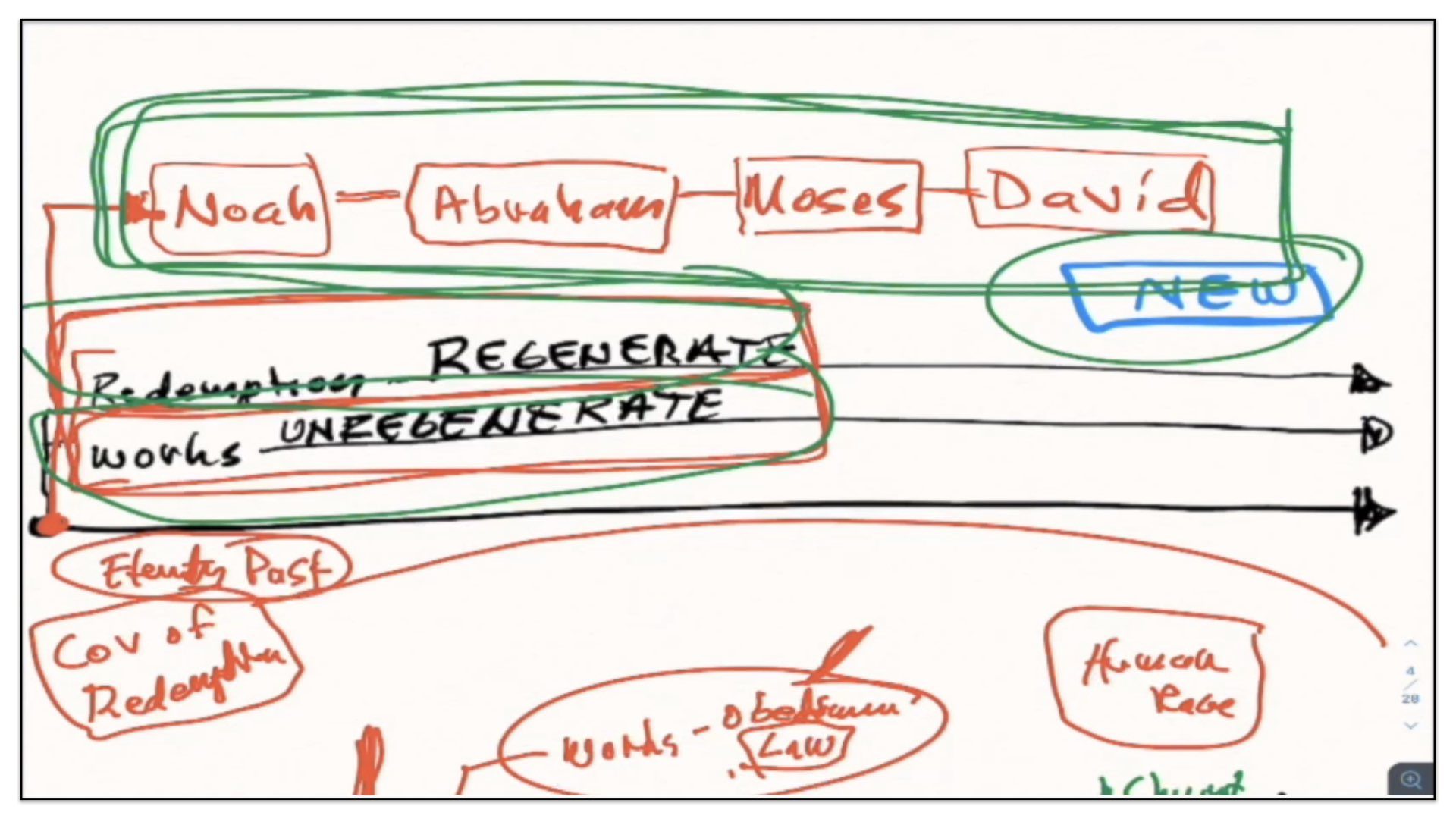
If you look at this framework, at no point do we find a conditional Covenant of Grace. These earthly covenants have nothing to do with it. And neither does the Covenant of Redemption or the Covenant of Works or this New Covenant. None of it deals with the conditional Covenant of Grace. Do you see, my dear friends, how different this teaching is from the Presbyterian view of reformed or covenant theology? And the Reformed Baptist view of covenant theology? And yet what I presented to you is truly an overview of covenant theology. This viewpoint has no voice in today’s conversation. This viewpoint is not new to me. I’m not giving to you some novel idea. These teachings are based on the development of Baptist teachings during the 18th and 19th centuries, among the Strict and Particular Baptist churches and some Congregational churches and Independent churches. They developed these ideas.
A Final Word
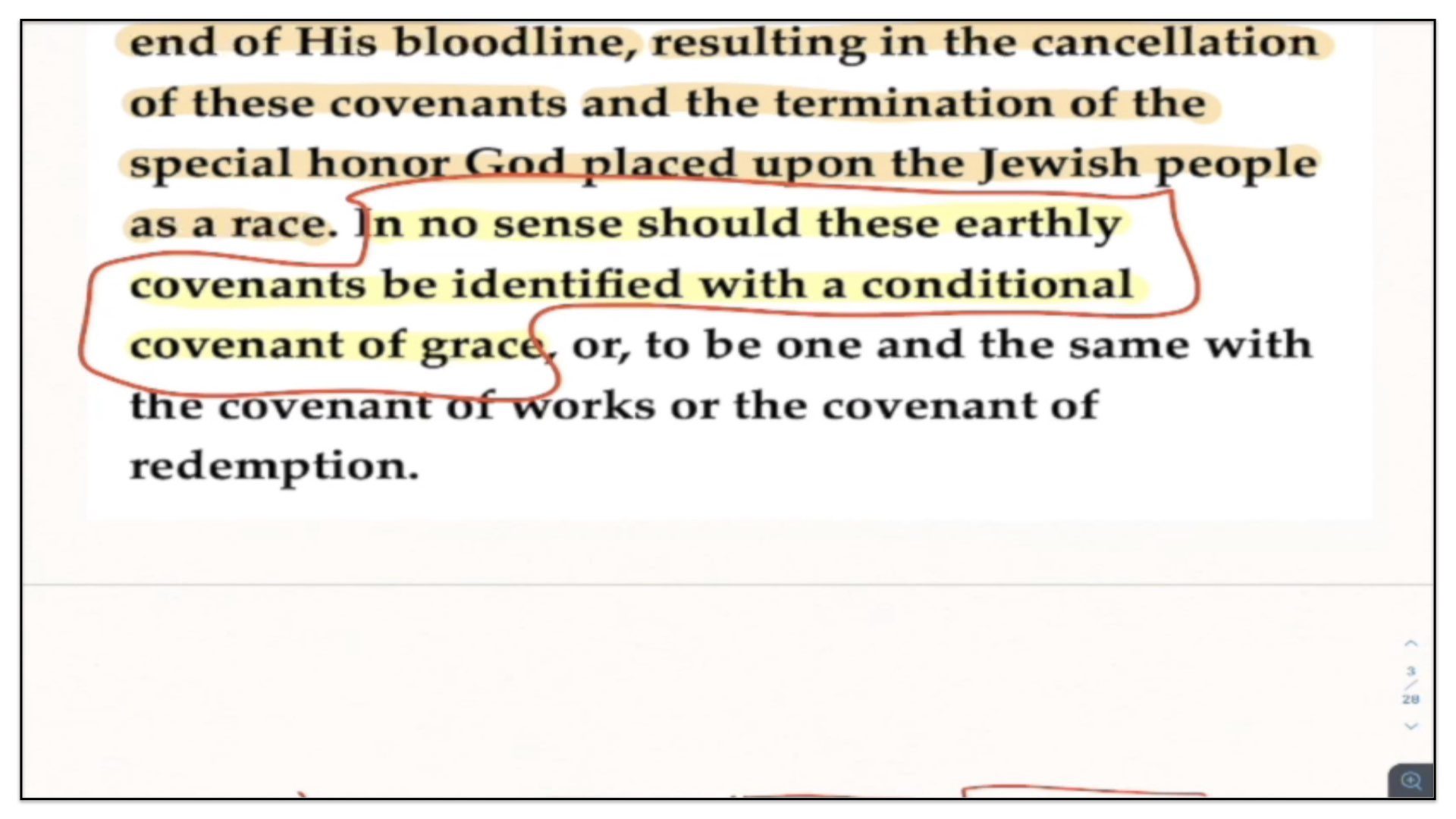
Now, let me caution you. The specific points I’m making on the earthly covenants. Yeah, maybe the way that I’m very much distinguishing them as earthly and temporary, and apart from the spiritual and and perpetual covenants. Yeah, that distinction is a little new. I’ll give you that much. But when it comes to the issue of a conditional Covenant of Grace, the development of teachings during the 18th and 19th centuries, they rejected that view which is the main point of this study.
Okay. Well, I hope it’s been useful to you to walk with me through these teachings. I realize the time has once again extended over the period that I would prefer to be teaching. I’d like to go shorter but I end up going longer. I can only hope that what I presented to you is extremely useful and you might not agree with all of the points I’ve made but if there’s been some things that have challenged you or perhaps helped you understand your own viewpoint on these teachings, then my purpose has been well served. And ultimately, of course, I pray the Lord’s blessings to be granted us as we grow in grace and in the knowledge of the Lord Jesus Christ. Well, I wish upon you those blessings until we meet again next week.
Jared Smith served twenty years as pastor of a Strict and Particular Baptist church in Kensington (London, England). He now serves as an Evangelist in the Philippines, preaching the gospel, organizing churches and training gospel preachers.
Jared Smith's Online Worship Services
Jared Smith's Sermons
Jared Smith on the Gospel Message
Jared Smith on the Biblical Covenants
Jared Smith on the Gospel Law
Jared Smith on Bible Doctrine
Jared Smith on Bible Reading
Jared Smith's Hymn Studies
Jared Smith on Eldership
Jared Smith's Studies In Genesis
Jared Smith's Studies in Romans
Jared Smith on Various Issues
Jared Smith, Covenant Baptist Church, Philippines
Jared Smith's Maternal Ancestry (Complete)




